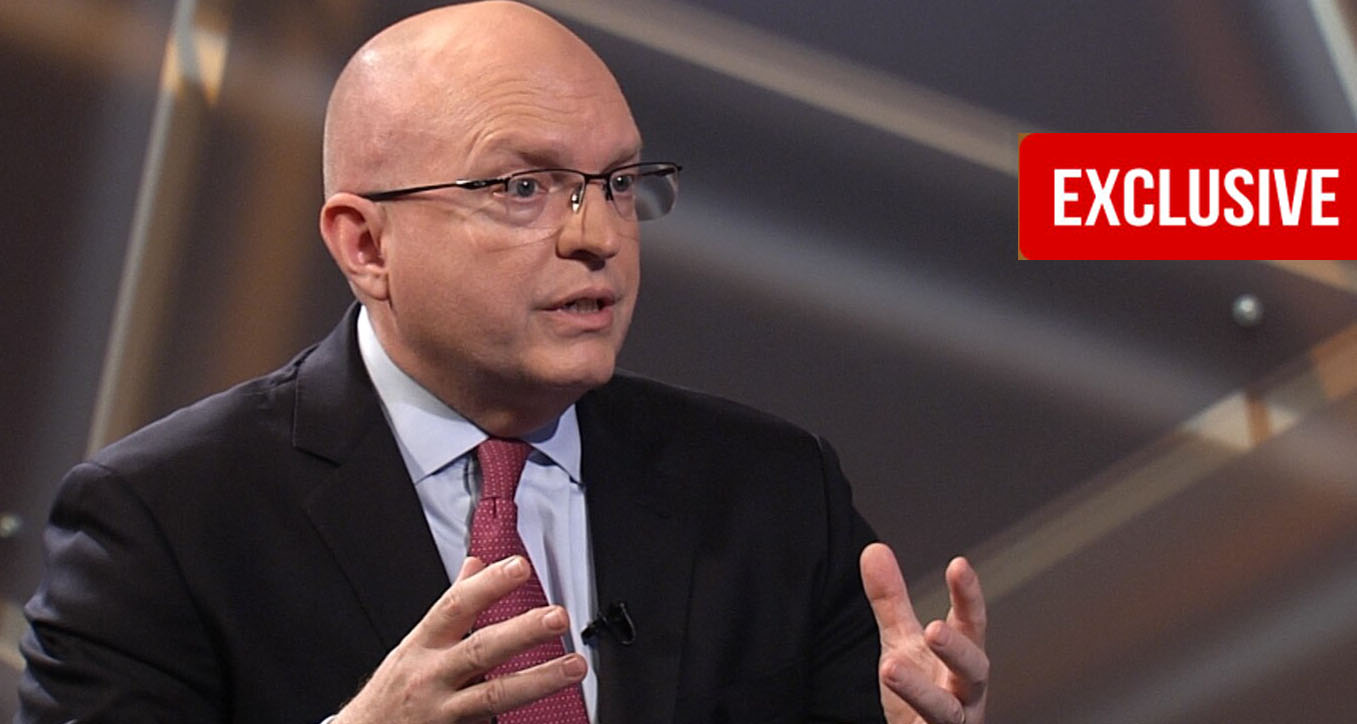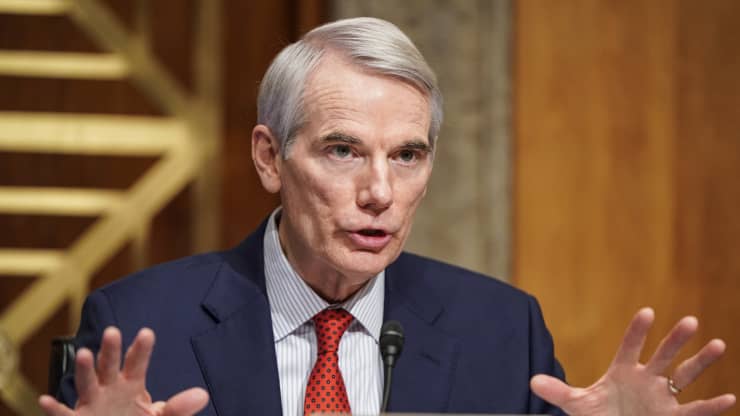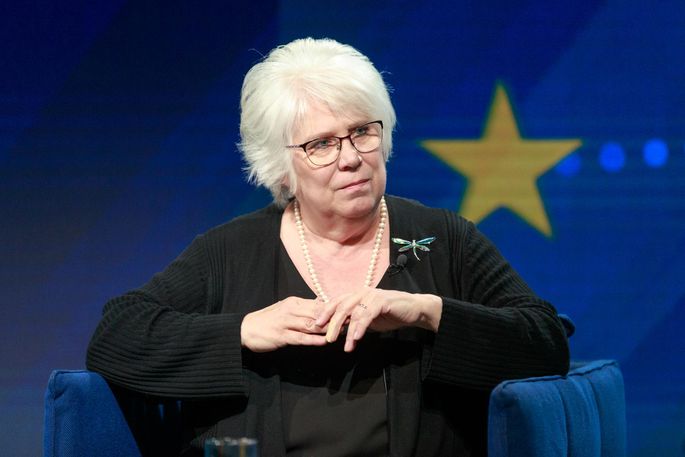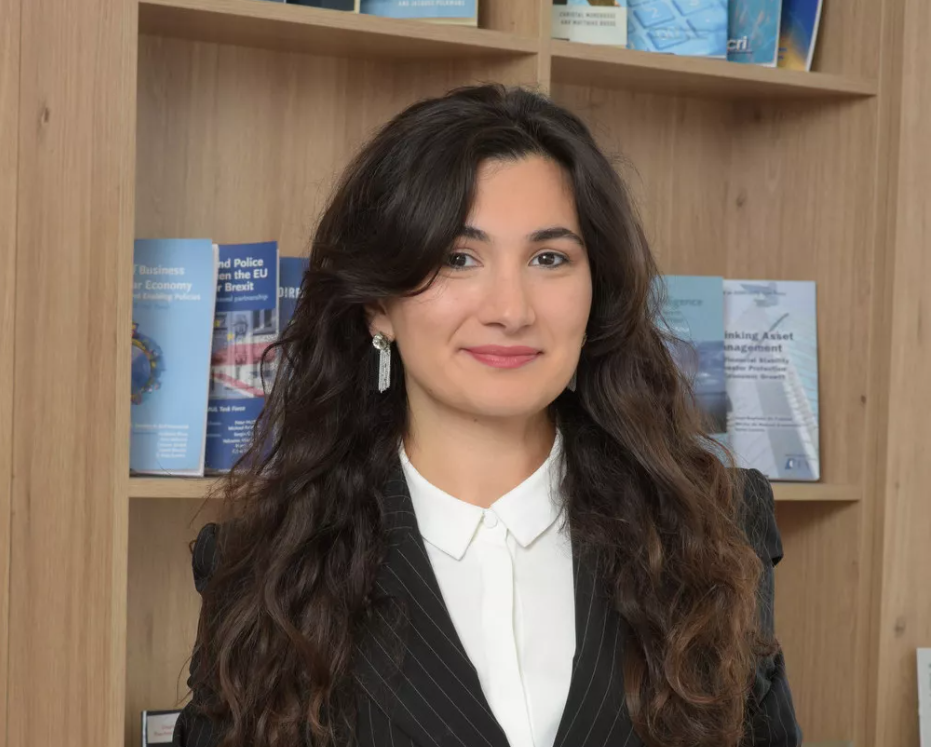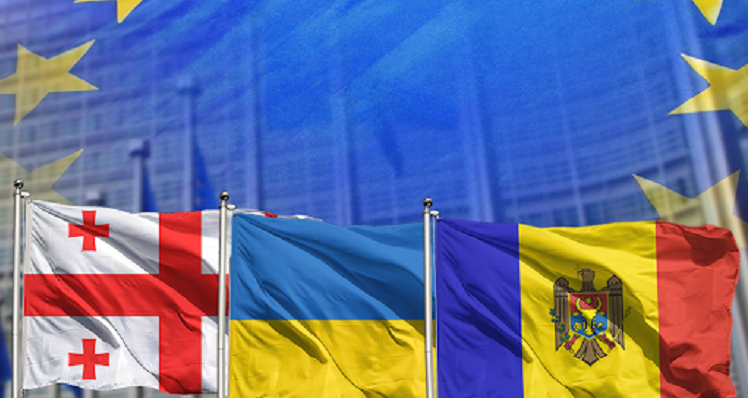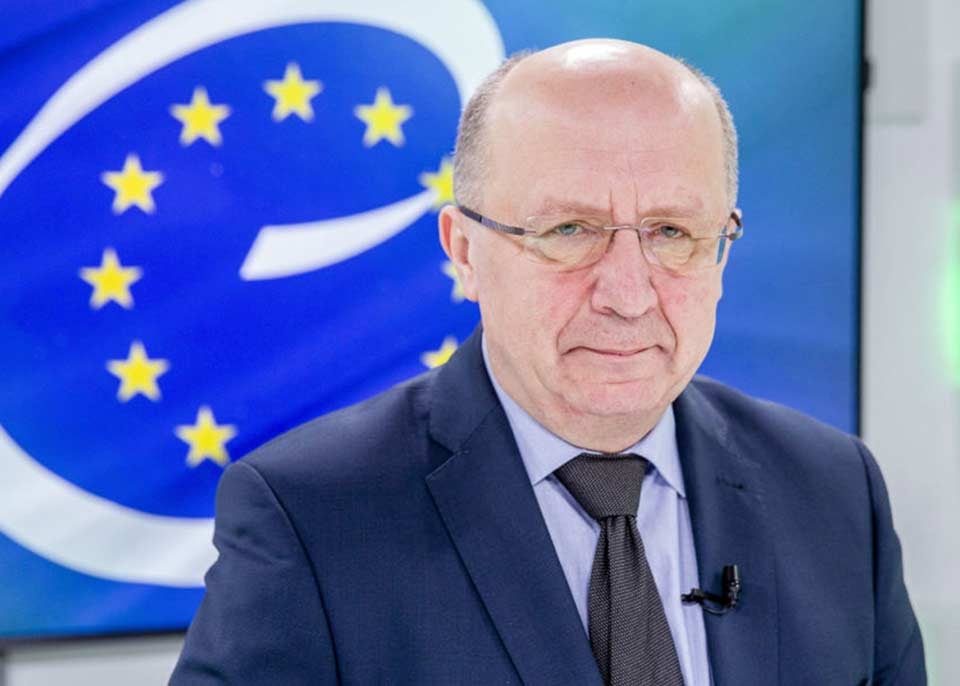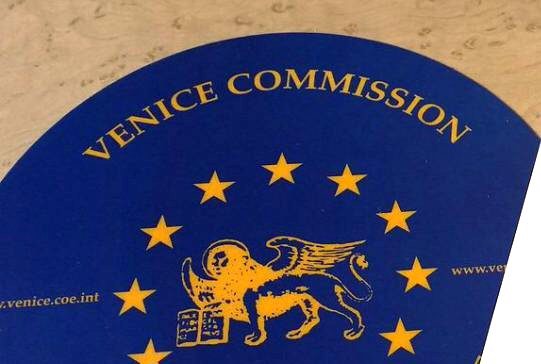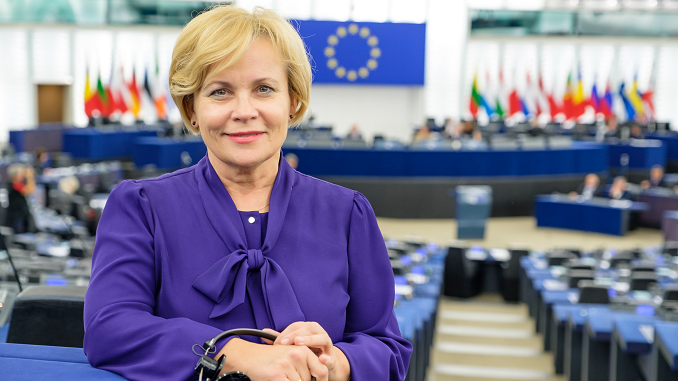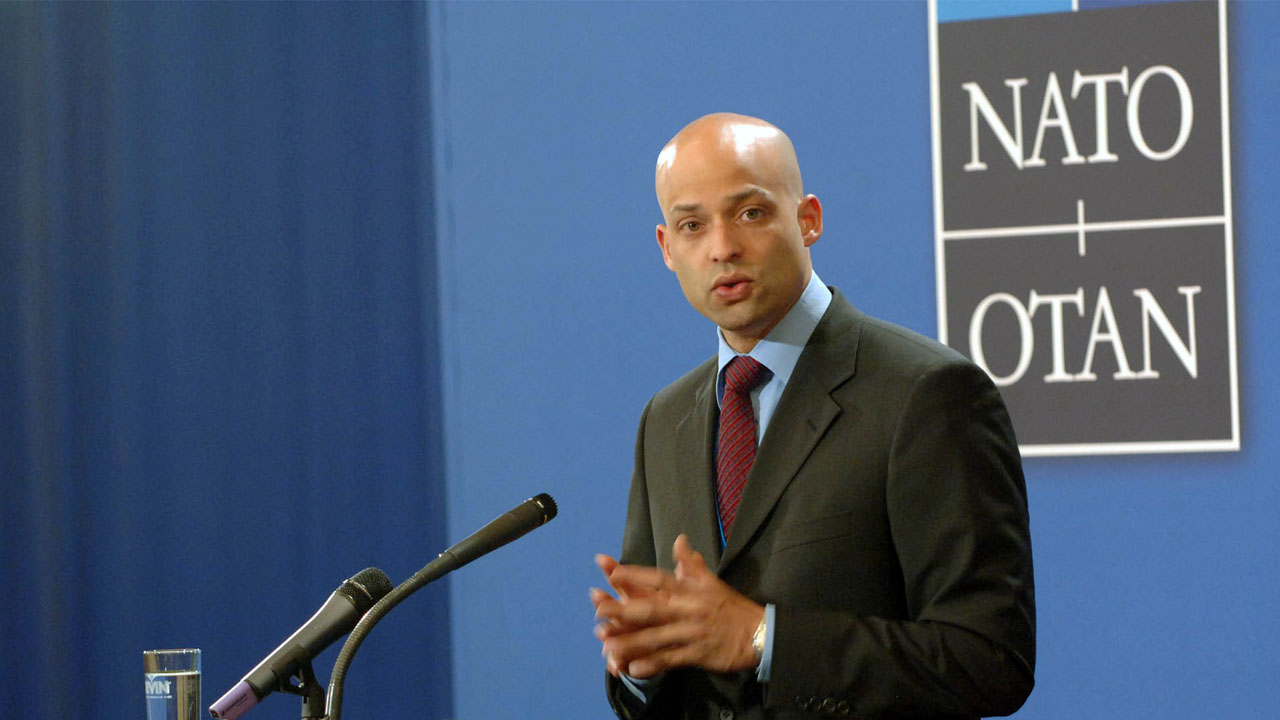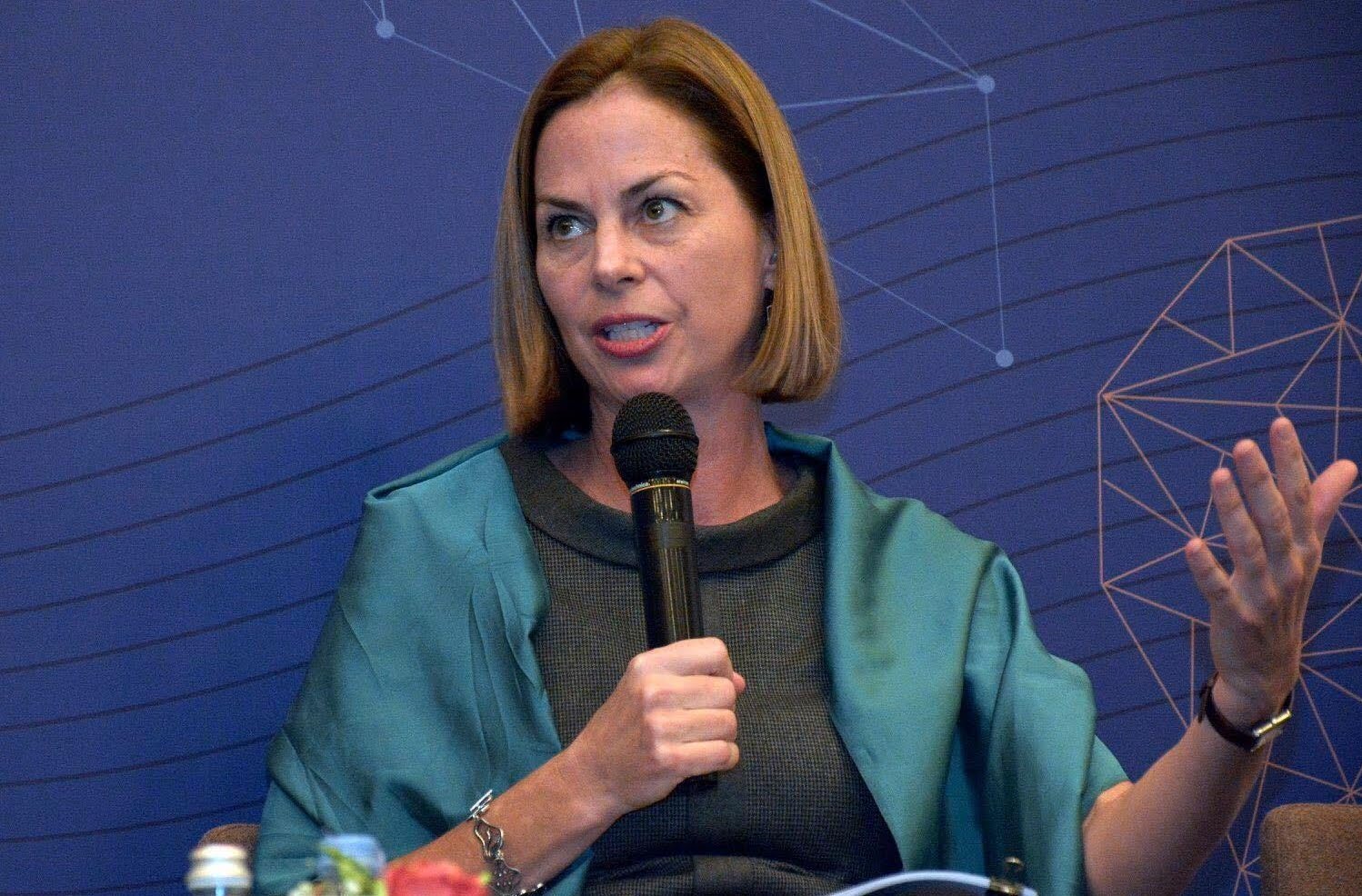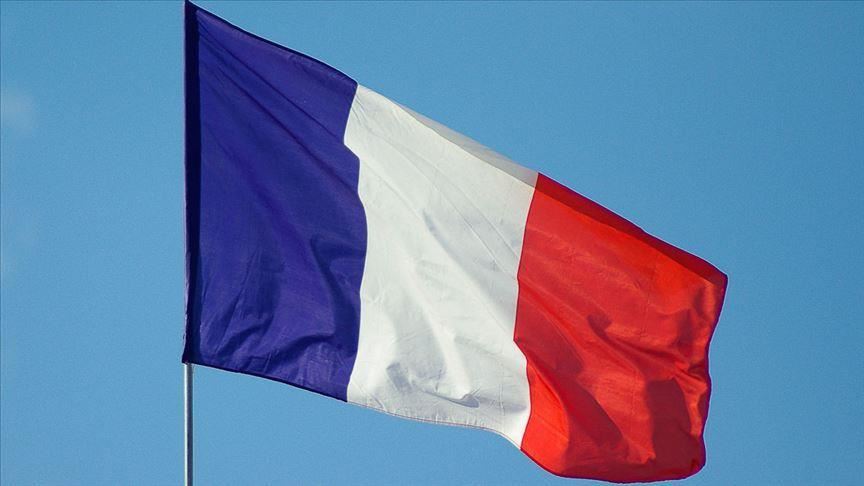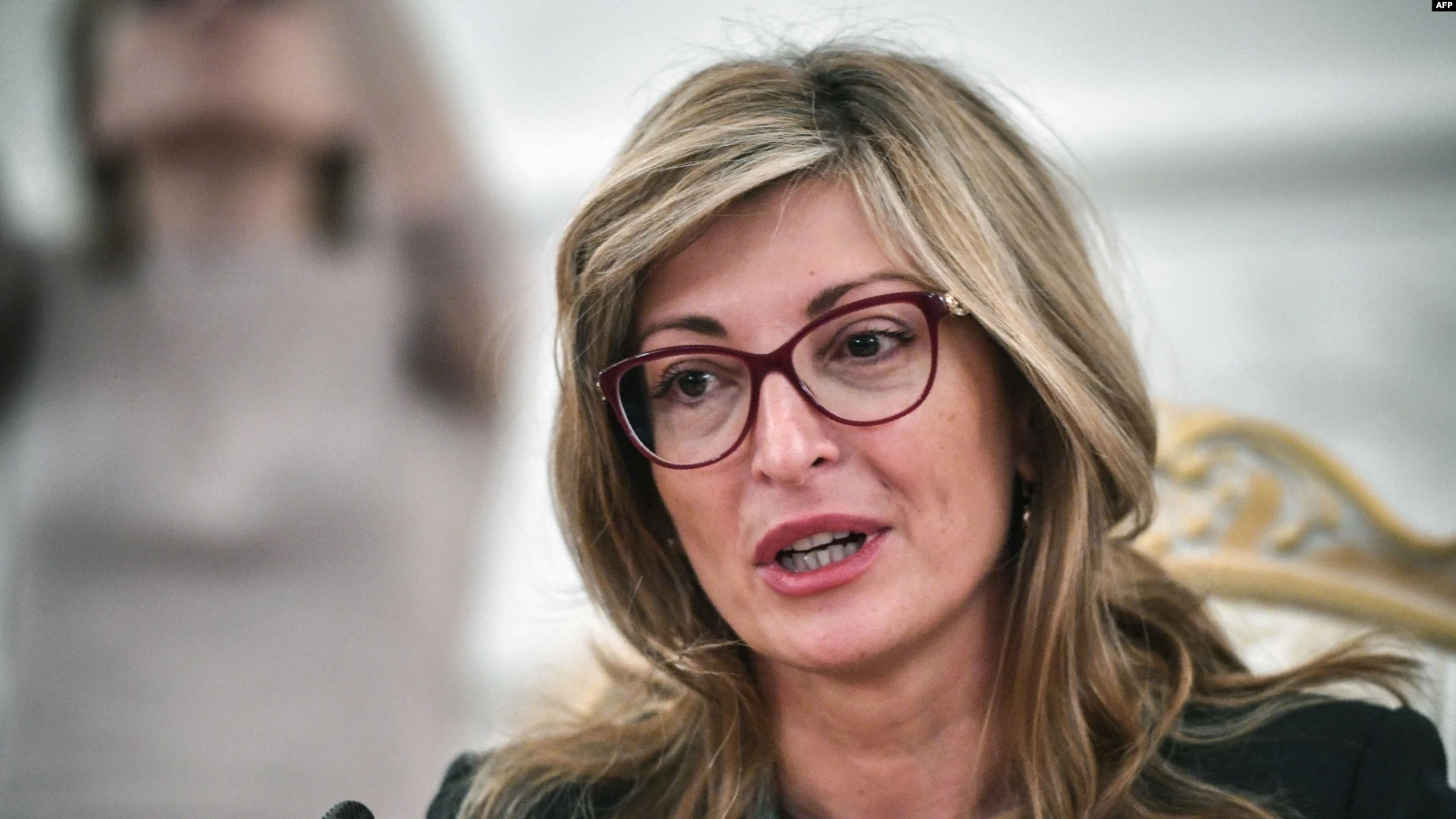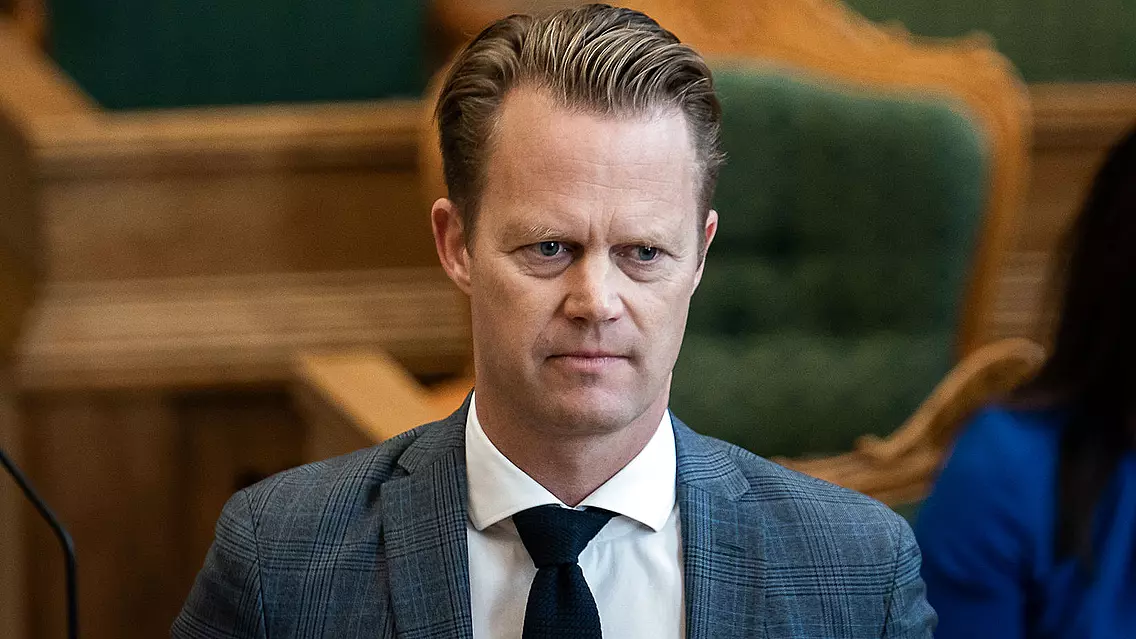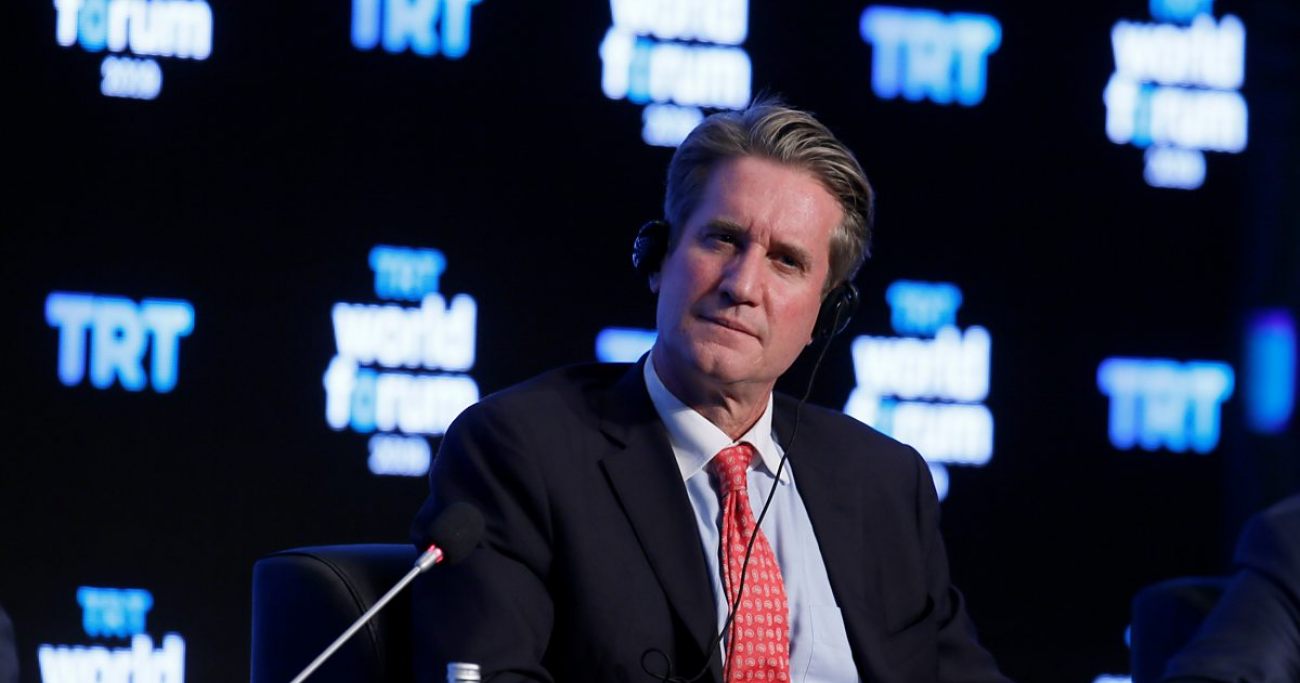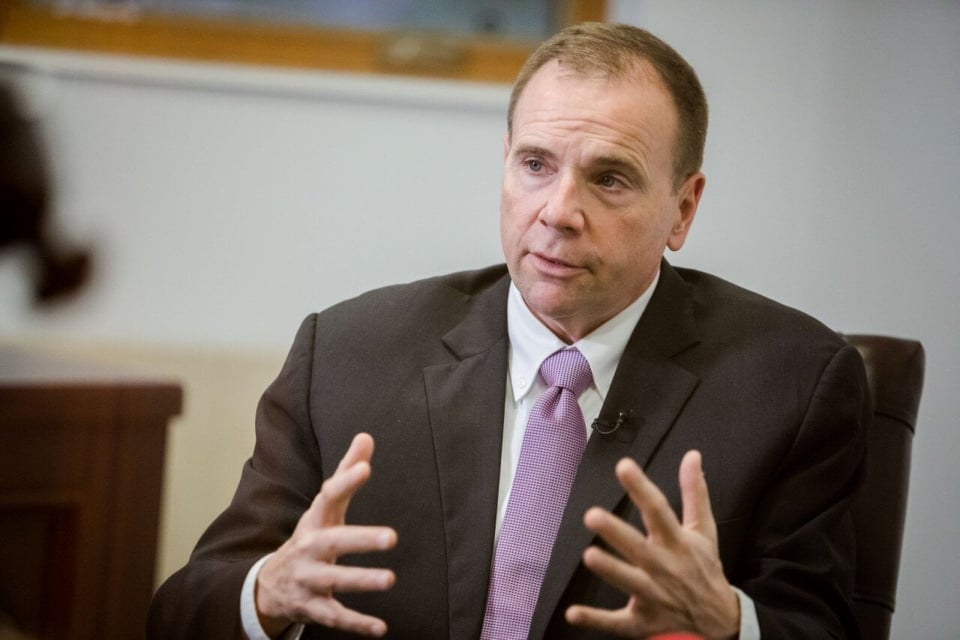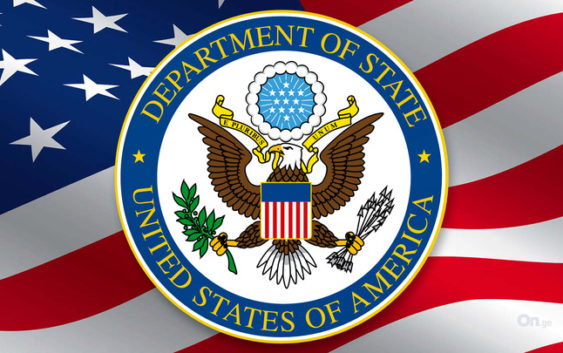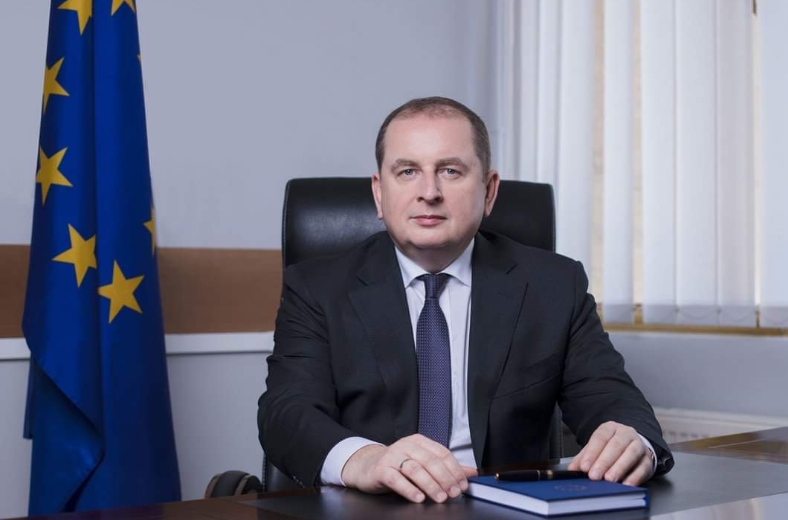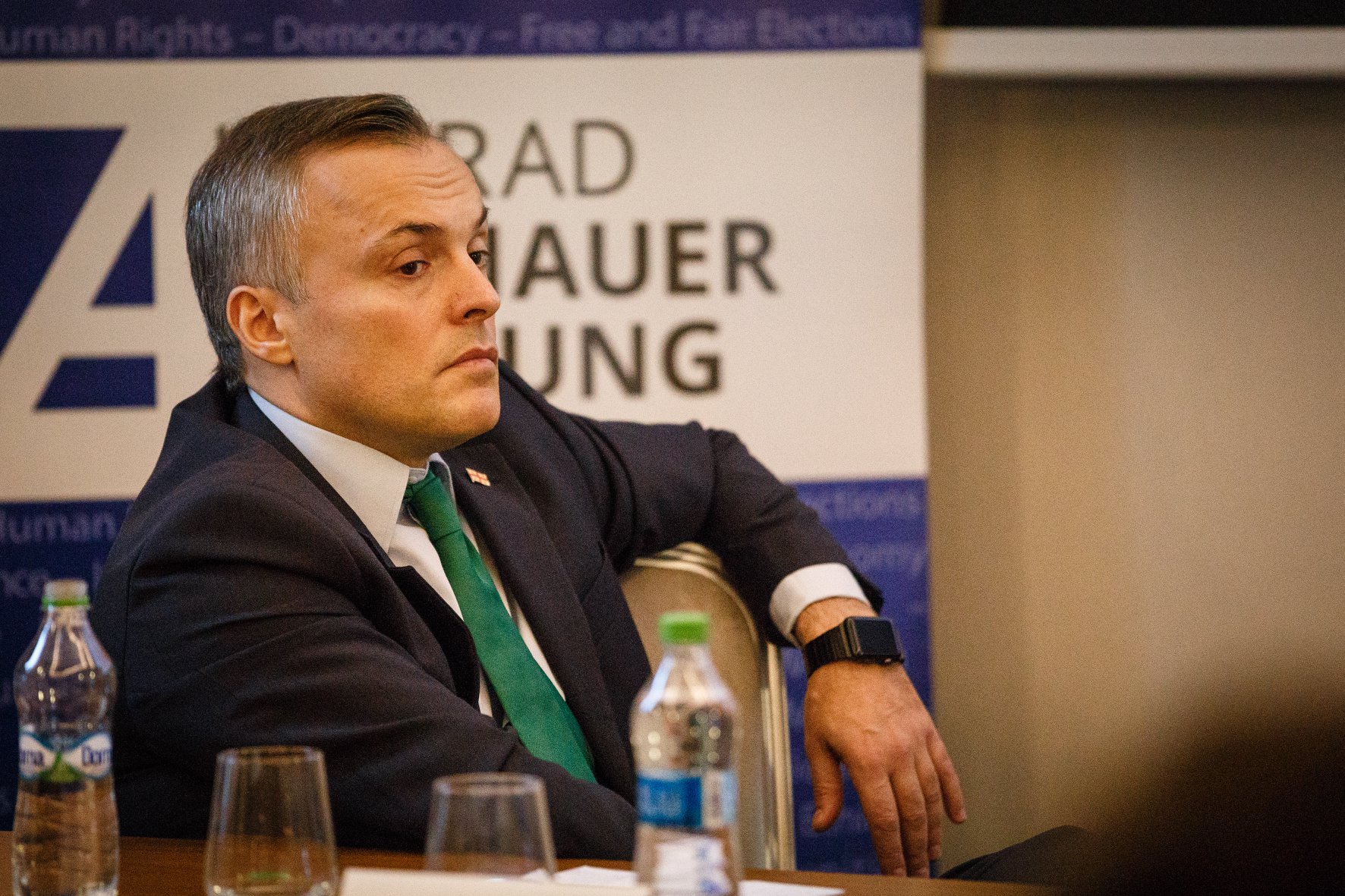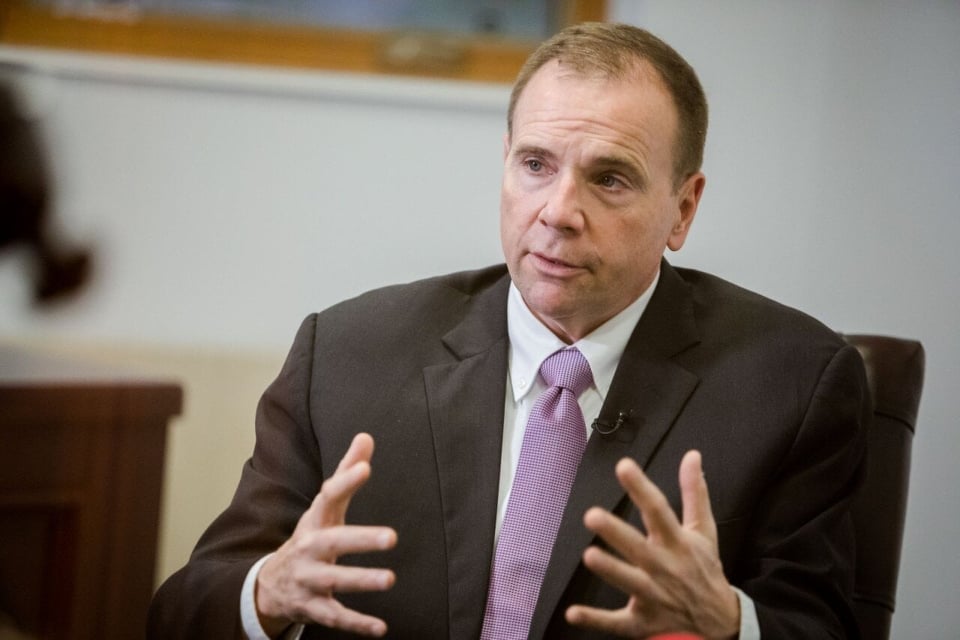Politics
Philip Reeker: The Anaklia Deep Sea Port and all the biggest infrastructure projects are a great opportunity
The Anaklia Deep Sea Port is a great opportunity, - said Acting Assistant Secretary of State for European and Eurasian Affairs, Philip Reeker, in an exclusive comment with Europe Time. „It is a great opportunity there. Create the environment and if it's for the attraction of investors they will come. This is an investment opportunity. That is why we want to help and support at this moment, "said Philip Reeker. As for the issue of the free trade agreement with the United States. Philip Reeker answered a question by Europe Time in this regard. According to Philip Reeker, strengthening the rule of law and reforms are very important elements that will help Georgia become attractive for international trade. "We appreciate Georgia's desire to boost trade relations with the United States. To do this, it is very important to continue the course of reforms. Among them, the implementation of the April 19 agreement and, consequently, the creation of a more attractive environment for international trade, in which the rule of law plays a very big part. As you know, the issue of free trade is the prerogative of the American Trade Representative. But I want to mention that in this process it is very important to develop a transparent business environment, and this process is going on between them, with our help as well", - said Philip Reeker. „We should encourage more direct investment in Georgia. One would be infrastructure, a particular port project, which is a huge opportunity for infrastructure investment. But also, there are so many other opportunities in agriculture and other commodities, including mining, including manufacturing, said Senator Rob Portman in an exclusive interview with Europe Time. He stressed that it is extremely important that more countries invest in Georgia. „I hope more American companies will do so. One reason some companies are concerned is because of the judicial system. So that is one reason the Judiciary System is important: it provides an opportunity for more prosperity for all Georgians because more foreign investments mean more jobs. One would be infrastructure, a particular port project which is a huge opportunity for infrastructure investment. But also, there are so many other opportunities in agriculture and other commodities, including mining, including manufacturing. So I think there is a great opportunity for more investment here to help Georgian people. Investment is good and we should encourage more direct investment in Georgia, but also more trade. So Georgia's top trade partner is Turkey, and its second is Russia. The United States is a very small part of that, so we need to figure out how to have more supply chains come in from Georgia to America or more exports to America and vice versa. Because I was involved as a United States Trade Representative, that is something I will be working on personally. I hope we can expand our trade-in addition to direct investment, "said Senator Rob Portman in an exclusive comment with Europe Time.
Senator Rob Portman: We should encourage more direct investment in Georgia
We should encourage more direct investment in Georgia. One would be infrastructure, specifically a particular port project, which is a huge opportunity for infrastructure investment. But also, there are so many other opportunities in agriculture and other commodities, including mining, including manufacturing, "-Senator Rob Portman said in an exclusive comment with Europe Time. He stressed that it is extremely important that more countries invest in Georgia. I hope more American companies will do so. One reason some companies are concerned is the judicial system. So that is one reason the judicial system is important: it provides an opportunity for more prosperity for all Georgians because more foreign investments mean more jobs. One would be infrastructure, specifically a particular port project, which is a huge opportunity for infrastructure investment. But also, there are so many other opportunities in agriculture and other commodities, including mining, including manufacturing. So I think there is a great opportunity for more investment here to help Georgian people. Investment is good, and we should encourage more direct investment in Georgia, but also more trade. So Georgia's top trade partner is Turkey, and its second is Russia. The United States is a very small part of that, so we need to figure out how to have more supply chains come in from Georgia to America or more exports to America and vice versa. Because I was involved as a United States Trade Representative, that is something I will be working on personally. I hope we can expand our trade-in addition to direct investment, "said Senator Rob Portman in an exclusive comment with Europe Time.
MEP Marina Kaljurand: My message is to not give up your dream of becoming a member of the EU and NATO
The Chair of the delegation to the EU-Georgia Parliamentary Association Committee, Marina Kaljurand, "is a very strong believer in open-door policy". In an exclusive interview with Europe Time, she stated that each nation should have the right to decide their own future and which organizations they wish to join. Marina Kaljurand speaks about Estonias example, "when nobody was expecting us in the EU and NATO. But it was a political decision. We were doing our reforms, we were trying to do our best, so we were waiting for the window of opportunity, and once it was open, we were lucky and happy to take advantage of it. Marina Kaljurand is an Estonian politician who served as Minister of Foreign Affairs (2015–2016). Earlier, she served as the Ambassador of Estonia to the United States (2011–2014) and in Russia (2007–2011). _Thank you for the interview. How do you assess EU-Georgia relations today? Of course, the recent political crisis in Georgia has had some impact on EU-Georgia relations, but I would urge you today to get back on track. Of course, we are following very closely the political developments in Georgia. Next month we will be at the Eastern Partnership Summit. In the autumn, we can look into more details on how far we are in this process. _As it is known, Georgia, Ukraine, and Moldova have signed a memorandum on establishing the Associated Trio. How do you evaluate this step forward by the trio of countries? I would urge you to try all the ways. All methods if it is your aim to have closer integration with the EU. So the cooperation among these three countries is a good thing, but you should also continue your bilateral efforts because the Eastern Partnership is very clear. It provides as much as the Eastern Partners are interested in, and they cooperate in the fields they want to cooperate in. Of course, also for democratic reforms. So, my advice would be to take advantage of all the different formats: the Eastern Partnership as such, the trio as such, and bilateral relations as such. When we are talking about a new format, I think about the close integration of different policies. I had a very good meeting with the speaker, Kakha Kutchava, and he told me that Georgia's future is in accordance with the same projects that we have in the EU. For example, the green deal, digitalization, and economic reforms. So you're trying to align yourself as closely as possible with the policies of the EU. I think this is a very smart approach because it means that we are developing new actions together very quickly, and I think, for example, economic cooperation, there is a lot we can do at the moment. So the economic status of Georgia should be like we have in Norway, Switzerland, Iceland. So, I believe that aligning different policies and formats is also very important. _What should be the main tenets and ideas of these three (trio) countries' new way of life? You should agree among yourself. But I do not see how there can be any closer integration without continuing democratic reforms. The international community and the EU are looking toward judicial reforms in Georgia, constitutional reform, and electoral reform in the same way they are fighting corruption in Ukraine. There are so many reforms where these three countries are on a different level, on advisement. So, while exchanging best practices, exchanging information, and cooperating at that level may be preferable, the EU, of course, urges you to continue with the democratic reforms. like to also say that I think it is important to draw from my country's experience when Estonia was exceeding the EU. For a long time, we were doing reforms to enter the EU. We were not doing that for the EU. We were doing it for our people. So I urged these reforms not because the EU demands it or because the EU wants you to do it. It is just because people want it, and they said it very clearly: they want to live in a society that is very much like the EU, they want to be a part of the EU, they want to be members of the EU. So, continuing the reforms is crucial not only for the EU but also for your people. _Georgia plans to apply for EU membership in 2024. How do you view membership prospects, given your statement that there is no consensus in the EU? I am a very strong believer in the open-door policy. I am a firm believer that each nation should have the right to determine its own future and the organizations to which it wishes to belong. And again, I come from Estonia. Trust me, we have been through that at the beginning of the 90s when nobody was expecting us in the EU and NATO. But it was a political decision. We were doing our reforms, trying to do our best, so we were waiting for the window of opportunity, and once it was open, we were happy to take advantage of it. So my message is to not give up your dream of becoming an EU or NATO member, be prepared, continue reforms, but at the same time, I urge you to be realistic. I do not see consensus in the EU or NATO. Membership is a political consensus. I do not see the consensus in the political parties in the European Parliament. I do not see a consensus among member states. There are very different opinions to the contrary. In Brussels, some states are still saying that enlargement in 2004 was a mistake. So there are so many different opinions. You should be determined to convince the skeptical ones that you deserve to decide a point in the future and that you deserve a unilateral political consensus decision. I do not want to speculate and predict, but personally, I do not think so, because I am speaking of the reality we have today. If it happens, I will be the first one to greet you as a member of the EU and I will be very happy for you, trust me. But I also want to be realistic and frank about the present situation. That’s why I was saying that I think that Georgian leadership should pursue its ambitions but also keep realistic expectations so the people will not be disappointed if they do not get a message by 2024. People will understand it is a process and one day the window will be open. I do not know when, but we should work together for the Georgian people as soon as possible. _We can hope that something will change in the next three years... it has been a long time before I agree. That’s why I do not speculate. I am speaking on behalf of the knowledge that I have today. I am a diplomat and former foreign minister, so I have seen how the accession decisions will be made previously, so that’s why I am trying to be realistic. But you should do everything possible to enter the EU and NATO. You should be persistent in convincing those who are hesitant. It is not about Estonia, because Estonia supports Georgia anyway, but about the countries that are much more hesitant, and I know that they are the big countries of the EU that do not have a treaty of accession today. Just remember what President Macron said. Look at the election in Germany. We do not know the result yet, but we do know the political landscape that will be there after that. We heard the commission's position on enlargement, so these are the signs that have to be taken seriously about – "yes". You have to try everything. You have to do everything to fulfill your dreams. We know that Russia has applied various methods to create a hybrid war against many countries, including Georgia. There are some expert opinions that say the European Union has a more constructive approach. What is your view of these relations, especially amid growth-based aggression from the side of Russia? In 2008, when war broke out, I was Estonian ambassador to Russia (2007-2011). I was an Estonian ambassador in 2007 when Russia had a cyber attack on my country. So I'm not naive about Russia, or about Cyber Challenges, or about information operations. I personally experienced that for years as an Estonian ambassador to Russia. By the way, when Georgia was Russia's enemy number one and I was the Estonian Ambassador to Moscow, we served Georgian wine in my embassy. Since Georgian wine was forbidden in Moscow, we brought it from our supermarket in Tallinn and we served it at the receptions. So I called it a little wine diplomacy in 2008. As for the EU, I think our relations are at the lowest with Russia, but at the same time, they are very frank and open. The visit of Joseph Borell to Moscow, as well as the press conference, were eye-openers for many Western countries hoping for or already having partnership relations with Russia. If you remember, the press conference was embarrassing and Lavrov made it very clear that he was laughing and not taking seriously the EU, its aspirations, human rights protection, the rule of law, and EU principles. That is reality, I think the principles of how we cooperate with Russia should be reviewed, but the basics should be the same. Yes, we have to cooperate with Russia on some topics. Mutual interests, the environment, crime, terrorism, are topics where we can cooperate. Second, we should not close our eyes to things that are happening in Russia. That’s why I am really proud that the EU is still united behind the sanctions introduced for Crimea, as well as the sanctions that followed the arrest of Navalny and recent developments. So, we should continue to remember the things that we do not think are right in Russia. Third, we should continue supporting exchanges, free media, and opposition, because I believe that this is the best way of advancing young people, not to live in society, but to see how democratic societies are functioning and what it means to be a member of the EU. I think this is the future of the younger generation. I do not agree with all the political statements of Navalny, but he has the power to bring the opposition together. Something I did not see in Russia is that the opposition will not reach out to people in the same way that Navalny and the opposition are, and, of course, very concrete and strong responses on cyberattack and information operations; we have the same goal, we have been targets of Russian cyber operations, and we can cooperate very closely here. So, I am really proud that my country has been supporting Georgia. During the war in 2008, I was a cyber expert, and we developed cooperation projects. Georgia is our priority for developing cooperation. So I am really proud that my country is a good friend of Georgia. _The NATO Summit will be in two weeks in Brussels. What could you say about Georgia's expectations? It is a very good question because we all remember the Bucharest summit, which said that Georgia and Ukraine should become NATO members and the next steps should be MAP and you do not have it after 13 years later. The NATO Summit will be in two weeks in Brussels. As with the EU, I would urge you to present your position to work towards receiving positive signals and positive answers from NATO. So, as I have said with the EU, that is a future your people have chosen. And you, journalists, politicians, and civil society, should work in the service of your people and towards the dreams that your people have expressed. So, you have the support of many friends in the EU and NATO.
Researcher at CEPS Tinatin Akhvlediani: The Memorandum demonstrates the readiness of Georgia, Moldova, and Ukraine to speed up their integration with the EU
The Memorandum signed by the three Associated states two days ago demonstrates the will, ambition, and readiness of Georgia, Moldova and Ukraine to deepen and speed up their integration with the EU. Said Tinatin Akhvlediani, Researcher at the Center for European Policy Studies (CEPS) in an interview with Europe Time. `Back in December 2019, the DCFTA states have already issued a statement with the request to launch the dialogue with the EU in the “Trio” format. Yet, the statement was not formally addressed by the EU. In this regard, the new Memorandum is an important step in making the cooperation among the AA countries more systemic and the awaiting response from the EU will demonstrate the EU`s readiness to support speeding up the European integration of the „Associated Trio“, - Said Tinatin Akhvlediani. _Based on the analysis and studies conducted by CEPS with regard to the Eastern Partnership countries, how would you evaluate Georgia's position in terms of relations with the European Union and the implementation of the Association Agreement? Let me start with a report which Michael Emerson and I have prepared last year for the European Parliament to assess Georgia’s Association Implementation. As pointed out in this study, Georgia is well on track with the implementation of its commitments laid down in the Association Agreement. In fact, there are areas in which the country even went beyond its obligations and aligned its legislation with the newest EU laws (for instance, in digital and cyber areas). Our most recent study on the comparison of the Balkan and the EaP states also shows that among the three Associated States, Georgia scores highest in terms of the implementation of the DCFTA. When it comes to political and legal governance, the country’s scores are roughly the same as for Ukraine and Moldova, owing mostly to the anti-corruption reforms actively implemented within the past decade. Up to date, Georgia still remains a relatively incorrupt state in the Eastern Partnership region, yet the most recent developments point to a stagnation in anti-corruption reforms and highlight that the country should reinforce its efforts to eradicate corruption. Moreover, Georgia recorded worsening its political reputation by the lack of democratic accountability, informal governance, and irregularities in the 2018 and 2020 presidential and parliamentary elections. _In your opinion, how did the current crisis impact the EU integration path, and don´t you think that it is crucial to implement reforms that would ultimately affect membership prospects? The current political crisis undoubtedly impacted Georgia’s political reputation and once more made it clear that deepening European integration very much depends on the country’s efforts to guarantee the rule of law, human rights, and democracy. In this respect, the EU has iterated in all its statements that undertaking reforms in the judiciary and the electoral system should be an absolute priority for the country. This was also highlighted in Charles Michel’s detailed proposal on how to resolve political conflict. Therefore, it is unequivocal that Georgia should implement needed reforms and address politicized justice and drawbacks in its electoral and judicial systems. The progress in these areas will be undoubtedly crucial for deepening the relations with the EU. _Internal political crisis by stepping up great efforts and mediation from the side of the European Union may be considered resolved at this stage, in your opinion, to what extent does the end of the crisis paves the way for further progress in the process of EU integration? While the EU has been criticized for being a rather weak geopolitical player in the Eastern Partnership, its active engagement with Georgia importantly reinforced the EU’s visibility and presence in the region. Through its effective mediation, the EU has managed to broker a deal among extremely polarized political parties, which seemed an almost impossible mission to do. Brokering a deal, in the end, highlighted that for both parties, for the EU as well as for Georgia, supporting Georgia’s European integration is strategically important. _Georgia plans to apply for EU membership in 2024. How do you view this prospect? In general, while considering the enlargement the EU follows the accession criteria, so-called Copenhagen criteria which puts forward three main conditions for the EU membership. These are the political criteria covering the stability of institutions guaranteeing democracy, the rule of law, and human rights; economic criteria implying having in place market economy, and administrative and institutional capacity to effectively implement the EU acquis and the obligations for the EU membership. The current political crisis highlighted that Georgia clearly has problems with the first set of conditions and meet political criteria by 2024 might be quite challenging. When it comes to the economic criteria, while Georgia has well advanced in terms of implementing the DCFTA, the Georgian economy overall still remains quite weak and fragile, casting doubts on the negative side effects of the deeper economic integration with the EU’s single market. The institutional capacity of Georgia has its own challenges in the “struggle for good governance”. Therefore, applying for EU membership in 2024 should be quite a challenging plan for Georgia. Apart from fulfilling the accession criteria, Georgia’s membership prospects very much depend on the EU’s political will and the EU’s policy in the Eastern Partnership region. The EU’s new EaP policy published in March 2020 did not promise membership prospects, nor many concrete upgrades in the relations with the EU-associated Trio, Georgia included. Yet the new policy framework put forward areas for enhancing cooperation, such as green and digital transformation. Guiding with the 'more for more' proposition from the EU, Georgia could strategize to deepen sectoral cooperation with the EU in these areas. _Don´t you plan some kind of research on Georgia's relations with the European Union, even within the Eastern Partnership? Well, we quite regularly publish papers, commentaries, and reports on the European integration of Georgia, Moldova, and Ukraine on the dedicated website: https://3dcftas.eu/. Our current studies include the Balkan and Eastern European Comparisons, comparative study across the EaP on the Covid effects on Digital Literacy, and upcoming editions of the trilogy handbooks on the EU-Georgia/Moldova/Ukraine Association Agreements and Struggle for Good Governance. Particularly in Georgia, we are currently working on the ex-post evaluation of the EU-Georgia DCFTA. This will be the first ex-post evaluation of the DCFTAs, commissioned by the European Commission, DG Trade, and it will bring quite interesting insights on the effects of the DCFTA on Georgia’s economic, social and sustainable development as well as the EU’s trade and neighborhood policies. The final report will be published in a years’ time, yet before then, your readers might consult the study website: https://www.dcfta-evaluation.eu/. Your readers might also find it interesting to read my blog written for the Georgian Institute of Politics on the new Eastern Partnership policy and Georgia’s Deliverables for 2020.
Ambassador Ran Gidor: Israel aspires to a complete cessation of hostilities
„Israel aspires to a complete cessation of hostilities and the civilian populations on both sides are pining for peace“, - Said Ambassador Extraordinary and Plenipotentiary of Israel to Georgia Mr. Ran Gidor in an interview with Europe Time. He also said that the Israeli government is also mindful of the need to create effective deterrence: _The United Nations speaks about the danger of a "full-scale war" in the Middle East. In the interview, you mentioned once the need for pressure on Hamas from the international community, what exactly should this activity be expressed? Hamas needs to understand that there is ‘zero tolerance’ among the international community towards terrorism, the indiscriminate shelling of civilian population centers, and the use of violence. Moreover, some rogue states (such as Iran), who continue to support Hamas (which is formally listed as a ‘terrorist organization’ in the US, EU, Canada, Australia, etc.), need to face the grim consequences of their choices. _International leaders speak about the need for de-escalation and make relevant calls. How do you find out the ways and steps towards de-escalation? Naturally, Israel aspires to a complete cessation of hostilities and the civilian populations on both sides are pining for peace. However, the Israeli government is also mindful of the need to create effective deterrence. Israel did not start this conflict, but rather – was taken by surprise at the sudden and unprovoked launching of rockets into its territory. Therefore, we need to try and make sure that Hamas will never again be tempted to undertake such an attack or start such a catastrophic adventure. Otherwise, we’d be doomed into an endless cycle of violence. _Bilateral relations are actively developing with all major spheres between Israel and Georgia, including regular bilateral and multilateral political dialogue, cooperation between the legislatures, inter-parliamentary friendship groups have been established. How do you assess these relations and what do you consider the main priority? Israeli-Georgian bilateral relations have always been excellent, as is evident by the overwhelming support we have been enjoying among all levels of Georgian society since the beginning of the current conflict. However, I think that too much stress has been placed on our glorious, shared past of 26 centuries of coexistence, and not enough effort has been made towards injecting our bilateral relations with fresh substance. Dialogues, friendship groups, and bilateral visits are all important in themselves, but ultimately they need to lead to practical results. Currently, our bilateral trade is minuscule (42 million USD in 2019) and the level of investment is quite low. Therefore, for me – the top priority is to use Israeli expertise in order to support the incipient Georgian high-tech ecosystem, to lay down the necessary framework of agreements that would boost bilateral trade and investment, and to support the creation of agricultural, scientific, and industrial joint-ventures. Moreover, last month (April 2021) Israelis were the second biggest group of foreign visitors to Georgia (after Turkey), and in 2019 more than 200,000 of my compatriots visited this country. Whereas Israeli tourism is an enormous source of revenue and jobs for the Georgian economy, we need to make Israelis realize that Georgia has so much more to offer than just khachapuri, khinkali and good wine. _Israel is a leading country in terms of vaccination, is there any additional program/project planned in terms of sharing experience? We know that the Embassy of Israel and the Agency for International Development (MASHAV) have made great efforts to assist Georgia in the fight against COVID19. Since the beginning of the pandemic, the Israeli embassy and MASHAV have made large contributions to all the relevant bodies fighting the spread of COVID19 in Georgia. We have supported NCDC (National Centre for Disease Control), the Georgian Red Cross Society, and the Georgia office of the WHO (World Health Organization). We have also invited some top Georgian public health experts to take part in an international forum convened by MASHAV on a bi-weekly basis in order to share best practices and lessons learned. Additionally, MASHAV (which has been operating in Georgia since 1992) has so far trained over 1,500 Georgian women and men in a wide spectrum of academic and professional disciplines, ranging from agriculture – to innovation & entrepreneurship – to public health. We will continue to support our Georgian friends and partners throughout this difficult period.
What brings a united action plan of strategic communications with the member countries of the European Union for Georgia, Ukraine, and Moldova
As already announced, Georgia plans to apply for EU membership By 2024. The country has to take great actions and do certain works before. The domestic political crisis that was resolved by mediation from the side of the European Union and personally Charles Michelle took the leadership to overcome the crisis, has left some caution and skepticism about Georgia in the EU. The MEPs unanimously stated that Georgia's Euro-Atlantic integration was at stake. Just as much careful Europe really needs a solid argument to expand its borders, herewith, Europe is immersed in problems due to the coronavirus pandemic. It is significant to have a defined communication strategy with the key partners and alliances based on common interests and values when Russia uses various methods to make a hybrid war against many countries including Georgia. MEPs and experts come up with such an initiative, For example, Co-President of the Euronest Parliamentary Assembly Andrius Kubilius in an exclusive interview with Europe Time said that Georgia, Moldova, and Ukraine need a united action plan of strategic communications with the member countries of the European Union. He noted that Georgia needs a highly effective strategic communication strategy with the EU institutions as well as EU member states to work together with Ukraine and Moldova for accelerating their integration process into the European Union and one of the ideas is we can discuss creating a kind of Think-Tank/platform that will be cooperated with institutional, political, civil, etc. and it will support the foreign goals of these three countries. `We are trying to speak with capitals, trying to organize some kind of networks with think-tanks, with political communities to speak about all those new ideas. We need some kind of joint action plan with the EU, Georgia, Ukraine, and Moldova, - said MEP Andrius Kubilius. Analyst Teona Lavrelashvili, Analyst Teona Lavrelashvili, who has interesting experience working in European structures and currently leads a political party program at the University of Leuven, while being interviewed with Europe Time stressed the importance of effective strategic communication from Georgia. According to her, a holistic diplomacy strategy is needed, which means more coordination of cooperation with political, diplomatic, and institutional (including academic/non-academic) actors. Teona Lavrelashvili believes that the cooperation should be intensified with think-tanks and various foundations, and it would be good if a vision is really developed that defines the possibility of establishing a kind of center/foundation/ think-tank in Brussels that will work in the direction of Georgia and/or the region (a similar foundation/organization can really form a trio - Georgia, Moldova, and Ukraine to jointly present a common position in the EU, this would be a strategic step politically and financially). Steven Blockmans, Senior Fellow at the European Policy Research Center (CEPS) and Head of Europe in the World, also welcomes the idea that Georgia would be institutionally involved in the `Future of Europe` conference and set out its vision about the future of the European Union. In his view, this initiative is not only strategically important for the image of Georgia at the European level, but also substantially interesting for Georgia and its citizens, as they will be allowed to engage in the process of creating and developing important policy for the EU.
MEP Andrius Kubilius: Georgia, Moldova and Ukraine need a united action plan of strategic communications with the member countries of the European Union
`Georgia, Moldova, and Ukraine need a united action plan of strategic communications with the member countries of the European Union`, - said Co-President of the Euronest Parliamentary Assembly Andrius Kubilius in an exclusive interview with Europe Time. `We are trying to speak with capitals, trying to organize some kind of networks with think-tanks with political communities to speak about all those new ideas. We need some kind of joint action plan with the EU, Georgia, Ukraine, and Moldova`, - said MEP Andrius Kubilius. _Internal political crisis by stepping up great efforts and mediation from the side of the European Union may be considered resolved at this stage, what will be the next step that makes more credible aspiration of the country towards Euro-Atlantic Alliance? That is exactly why we were very much concerned about this political crisis, which lasts a quite long time, not only after elections but before the elections. That is why we were involved intensively in all those attempts to assist overcome the crisis. And I am really happy that the crisis is over and I am also happy that the EU and personally Charles Michelle took the leadership to resolve the crisis. That is again a good example of how the EU can be effective in resolving some of those challenges. those problems are not only in Georgia. For example, Moldova, Belarus has major problems. So, maybe, that Experience which the EU got in trying to assist Georgia, will be useful for the EU to find a way how to assist others. Why Georgian Crisis was bad from our point of view, it is not only domestically... Georgia was losing some momentum with that crisis, but we considered that Georgia really is a front runner among Eastern Partnership trio countries. we asked the famous think-thank (CEPS) in Brussels to make an analysis and they produced a very interesting study comparing with the Western Balkan and Eastern Partnership countries. As a result, Georgia is among the leaders of both regions. Georgia is among the leaders which is an argument for us to discuss again that there is a need to reform Eastern Partnership Policy to make it much more similar what the EU policy to the Western Balkans. And maybe to offer some kind of more practical integration path for such kind of countries like Georgia, Moldova, and Ukraine. Really, what is very much needed is a clear and very well-defined strategic communication strategy for all three countries to lobby in all the capitals. We are trying to do also the same from European Parliament, we are trying to speak with capitals, trying to organize some kind of networks with think-tanks, with political communities to speak about all those new ideas. We need some kind of joint action plan with the EU, Georgia, Ukraine, and Moldova. Maybe, it is a beginning to propose some kind of intermediate status, which was proposed for the first time by Romano Prodi (sharing everything with the Union but institutions). I mean that countries like Georgia, Ukraine, and Moldova could have also benefited from membership, like integrated into a single market. So, there is really important as a next step where Georgia can really be one of those which can promote the idea after the crisis. Georgian Government, ruling party plan to apply for EU membership by 2024. So that integration path is really very important not only for Georgia, also for Eastern Partnership countries. Maybe, for the European Neighbourhood Policy and I hope that we should be really able to walk together with Georgians and trio countries pushing some of those big ideas. What about at the congress of `future of Europe`, I will be really happy if all the countries of the Eastern Partnership invite to participate. Creating a think-tank community is a very good idea. _We know that Russia has applied various methods to make a hybrid war against many countries including Georgia. There are some experts’ opinions that the European Union has a more constructive approach. What is your view of these relations especially amid growth-based aggression from the side of Russia? We need some clarity. When we are talking about engaging with Russia, what do we have in mind? Some capitals have a mind, let us engage with Putin. Russia consists of two major `pilots`. One is Kremlin and the second is Russian ordinary people. I am much more in favor of engaging with ordinary people and much less I see any kind of positive outcome with new attempts to engage with Putin. Putin will not change himself, but the Russian people can change Russia. There is a question of how we can assist Russian in its attempts to transform Russia and How we can engage with them. There are several things, one thing is really to help them defend Human rights, election rights and so on which Putin is threatening very much. Second point, what we are stressing everywhere, what the EU can do to help the Russian people in their attempts to transform Russia. The EU should be much stronger in its policy to Eastern Partnership Countries, success of Eastern Partnership Countries is really the best example of what the Russian people can achieve if they will also move with democratic developments in Russia. The Succes of Eastern Partnership Countries is not against Russia. It is in favor of Russian Development, of Russian democratic development. The Succes of Eastern Partnership Countries is not allowed for Putin, because if Russian people will follow Georgian or Ukrainian example, such regime like Putin regime will collapse. _How you see the role of EPP in the resolution of the crisis and generally, its involvement in internal political issues? EPP is among political groups in European Parliament. Despite the fact who is in power and who in opposition, Georgia is really very important for us, the same with Ukrainian, the same with Moldova. The Second Point is We would like to see in all those countries EPP family political party`s success, but sometimes we cannot be better Georgian Politicians than Georgian politicians are themselves. My opinion was very simple also for opposition to UNM and European Georgia. This political crisis was not bringing any kind of political dividends. My advice was to get out of the crisis, but of course not forgetting what you were demanding, but don`t continue the crisis forever because you will start to lose your people trust and then you can also start to lose the trust of international partners.
Richard Barrett: The main goal is to establish an efficient and fair appointment procedure for judges of the Supreme Court
The Venice Commission in its urgent opinion welcomes the amendments to the Organic Law of Georgia on Common Courts, which have taken into account several of its previous recommendations. Nevertheless, there are certain outstanding recommendations that should be considered in order to ensure even greater clarity of the legislation, transparency, and fair treatment for all candidates. As far as shortlisting and voting are concerned, the Venice Commission has praised the amendments for explicitly mentioning the principle of equal treatment of candidates, shortlisting only candidates who have achieved the best results, and disclosing the identity of the voting members of the High Council of Justice (HCoJ). Voting as such is an imperfect mechanism, as it is difficult to base an efficient merit-based appointment on a voting procedure; however, the level of transparency now proposed together with an appeal process should be of some help, the Venice Commission notes. As for the appeal mechanism, the Venice Commission welcomes that decisions by the HCoJ are now open to further appeals to the Qualifications Chamber of the Supreme Court. The Venice Commission, however, repeats its earlier recommendation to consider modifying the composition of the HCoJ that would take a new (second) decision on the same candidate after the appeal to the Supreme Court’s Chamber has taken place. Besides, the appointment procedure should have stayed until the Chamber renders its decision. These recommendations are made to ensure a meaningful right of appeal, the Venice Commission says. The current situation where the Georgian authorities wish to retain the ongoing competition under which initial interviews already took place under old rules, and the new interviews will be governed by new rules, “needs to be handled with great care, as it raises a major concern of equality of treatment of candidates”. To ensure that there is an equality of treatment of candidates, the selection procedure may need to be restarted, the Venice Commission recommends. „This is a sensitive area where the aim must be to attract the best candidates to help the administration of justice in Georgia and see that the candidates are treated equally. The process should also be as transparent as possible to maintain public confidence“, - said one of the rapporteurs for the Urgent Opinion on Georgia, Mr. Richard Barrett, member of the Venice Commission for Ireland in a comment with Europe Time. `Progress can be noted in the amendments by the introduction of a reference to the principle of equal treatment for all candidates in the public hearing procedure and by explicitly stating that only candidates having achieved the best results are shortlisted. Also, the wording used on the non-disclosure of the member of the High Council of Justice (HCoJ) identity with respect for the evaluation decisions and justifications has been removed and failure to supply reasons will disqualify the member of the High Council of Justice from the entire procedure. Last but not least, the introduction of the possibility of appealing subsequent decisions by the High Council of Justice to the Qualifications Chamber of the Supreme Court is also progressing to be welcomed and is going in the right direction`. As for the main problems and achievements in the area in question, Mr. Richard Barrett stressed that “the main goal is to establish an efficient and fair appointment procedure for judges of the Supreme Court”. `This means that there are certain elements that must ensure that the procedure is fair in its treatment of all candidates and that there is a meaningful right to appeal. In this respect, there are a number of outstanding issues that still need to be tackled and these include staying the entire appointment procedure – for all candidates – when an appeal is made by one of them to the Qualifications Chamber of the Supreme Court. This is important for there to be a meaningful right to appeal. The composition of the HCoJ for subsequent decisions should also be modified so as to ensure that there is no bias (etc.) – following the normal recusal procedure for members of the HCoJ, in this case, would not be adequate. Finally, these current amendments are indeed welcome but their enactment during the current competition may have consequences for the candidates in that competition. In order to ensure that candidates are treated equally despite the amendments happening during the competition, it may be necessary to take some steps in the process again or even restart the process completely. On the whole, it is very difficult to base an efficient, merit-based appointment, on a voting procedure, as is done in the procedure for the appointment of Supreme Court judges in Georgia. Notwithstanding this fact, the level of transparency now proposed together with an appeal mechanism should be of some help`, - said Mr. Richard Barrett. The opinion was requested on 8 April 2021 by the Speaker of the Parliament of Georgia. It was prepared under the Quick Response Mechanism, financed by the European Union and the Council of Europe, and implemented by the Council of Europe in their Partnership for Good Governance, phase II.
MEP Rasa JUKNEVIČIENĖ - Vice-Chair of the EU-Georgia Parliamentary Association Committee: Georgia’s EU membership is realistic
‘Political agreement is a very important beginning of the new era, new situation in Georgia. It’s possible to find some kind of ways step by step to be part of European Union or even closer partner of European Union as it is now. We do reforms not only to officially become members of EU, it’s not enough to have official stamp that you are a member of EU, you need to be European, you need really to become a part of Europe doing reforms and changing the lives of the people everywhere, in social affairs, in economy, in culture… When political situation will be ready for invitation to become part of European Union, most important is that Georgia would be ready for that moment. It is also very important that a new generation come to the politics and change somehow the old traditions that were not the best. And that’s why I think the country went into this crisis. - In an exclusive interview with Europetime, MEP Rasa Yuknevichyan, Vice-Chair of the EU-Georgia Parliamentary Association Committee, talks about the amnesty negotiations, the EU-brokered political agreement in Georgia, the prospect of Georgia's accession to EU and NATO as well as Russia and the current developments in Ukraine. _We have witnessed the unprecedented engagement of the European Union in resolving the political crisis in Georgia - the two-time visit of the President of the Council of Europe Charles Michel to Georgia, as well as the appointment of his special representative. In your opinion, what did these unprecedented efforts / engagement indicate, and whether this is to some extent related to recent developments in the region, I mean Karabakh, as there were some speculations that the West was rather late in responding there. All Georgia’s friends here in European Parliament really are very happy that Charles Michel decided to mediate or to be part of negotiations in this one of the deepest political crisis after the parliamentary elections and of course it is not related to other crises in the region maybe because the crises are very different; military actions or real war which happened because of Karabakh is one thing, and the European Union of course is not a military organization to prevent or to help in this way. But Georgia with the European Union is part of Association Agreement, important side of that and only two countries - Georgia and Ukraine are under this comprehensive and strong relationship from all six Eastern European partnership countries. So, of course Georgia is very important for European Union and that’s why I think that Georgia matters, but on the other hand we hope that for Georgian politicians EU also matters, and I hope that it will be in the future as well. _After the agreement, the opposition entered parliament for the first time. The agreement was signed by the opposition, with the exception of a few parties. How would you assess the current dynamics and ongoing negotiations on the amnesty bill? First of all I hope that all political opposition parties will be back to the parliament and this problem will be solved. I understand how important it is. All parties will be back. I understand how important the issue of political prisoners is and also European Union will offer its support as well. As I know Nika Melia accepted proposal to pay the payment and that crisis will be solved. _Now that the agreement has been signed, how do you think the relations between the EU and Georgia will develop? As we know, the Government of Georgian has announced its goal to apply for EU membership in 2024. This agreement I think is a very important beginning of the new era, new situation in Georgia. And Georgia needs new drive not to be a hostage of one or another personality but to build a really responsible political system, political parties with responsible leadership. The year 2024 is an ambitious goal to deliver the official document for future membership in European Union in one or another form. So, it is very important for Georgia to be leader on this way, leader of democratic reforms, leader of parliamentarianism, leader on possibilities to give up with the past not the best traditions in politics, I mean haters, hate speeches, how opposition is treated. It is a full understanding that both sides - ruling party and opposition are very important for Georgia to achieve these goals. So it is very important that a new generation come to the politics and change somehow the old traditions that were not the best. And that’s why I think the country went into this crisis. We had very important meetings with the ruling party and opposition and they understand these goals. All of them declared they are very much pro-European and that the Euro-Atlantic path for them is very important, and I hope that this goal will unite political parties. And although they have different understanding on the future of some domestic issues, it’s very important to unite themselves for these global issues for Georgia. _Do you think that Georgia should get the prospect of EU membership? How realistic is it that the EU will grant Georgia candidate status, or can there be another initiative, for example, a kind of special partnership? Of course it is realistic but we have to find together the realistic ways, maybe not membership next day after the application, of course not, but it’s possible to find some kind of ways step by step to be part of European Union or even more close partner of European Union as it is now. All the cards now are in the hands of Georgia. I’m always saying these reforms are not for European Union. You need to do reforms for membership - these reforms first of all are for the people in Georgia and if you will do these reforms despite the fact that you still do not have official invitation, it will be positive for Georgia, for the development of Georgia, for the people, for their lives. So, countries that joined the EU enjoy a lot of benefits. We did reforms not only because officially became members of EU, it’s not enough to have official stamp that you are a member of EU, you need to be European, you need really to become a part of Europe doing reforms and changing the lives of the people everywhere, in social affairs, in economy, in culture… if day x will come when political situation will be ready for invitation to become part of European Union, you will be ready. Most important is that Georgia when the day x will come would be ready for that moment. _As for Ukraine, do you think the tactics “let’s not provoke Russia” does not actually work the time has come for Ukraine and Georgia to join NATO? So, Russia’s military buildup next to Ukraine is not over. By this moment they may have declared that they will decrease the number of troops there but it did not happen and they still are occupying Crimea and they are in Eastern Ukraine. So, I think the story is not over yet. But on the issue when some politicians in European Union still think that ‘don’t provoke Russia and it will help’ I don’t think so. I think it was a mistake then in 2008 when NATO Membership Action Plan was not provided for Georgia and Ukraine in Bucharest and it provoked Russia to act against Georgia because they understood this is weakness of NATO not to be strong enough to provide this Membership Action Plan; so it’s opposite, Putin is acting as an opportunist and he is acting as much as he is allowed sometimes to act. So I think that the biggest provocation for Russia is to leave countries like Georgia, Ukraine, Moldova and other countries in this vacuum of security. So, vacuum of security is the highest provocation for Putin to act.
James Appathurai: NATO and Georgia also sharing situational awareness in the Black Sea to ensure that the Black Sea remains a source of stability and security, for NATO Allies and partners
NATO and Georgia also sharing situational awareness in the Black Sea to ensure that the Black Sea remains a source of stability and security, for NATO Allies and partners - Said NATO Deputy Assistant Secretary General for Political Affairs and Security Policy and NATO Secretary General's Special Representative for Caucasus and Central Asia, Mr. James Appathurai in an exlusive interview with Europe Time. He also said that NATO will continue to assist Georgia with practical support through the Substantial NATO-Georgia Package which was recently refreshed: _How does NATO view the agreement reached between the political parties in Georgia? In one of the interviews you mentioned that if the parliament does not function properly, this is a signal of a poor level of democracy in the country. After reaching an agreement and somewhat taking a step towards ending a political crisis, what do you reckon, what does the country indicate now, which is aspiring to join NATO? The political agreement in Georgia is really good news for all concerned. In the first place for the citizens of Georgia, as their elected representatives can get to work and the Government can focus on current challenges such as the Covid crisis and its economic impact, as well as the difficult but necessary reforms of the judiciary. It is also good news for politicians in Georgia, as the agreement provides for a series of mechanisms and safeguards which should allow all politicians from across the political spectrum to engage in dialogue on substantial issues, and to cooperate in a constructive manner. Finally it is also good news for all of us in the international community who want to see Georgia succeed. We hope the agreement will generate a renewed momentum in domestic reforms, and will also bring Georgia closer to its foreign and security policy objectives to integrate with the EU and NATO. Therefore I highly appreciate the efforts by the EU Council President’s Special Envoy Ambassador Danielsson, and the US Ambassador to help make this possible. Looking ahead, NATO will also follow with interest the implementation of the successive steps stipulated by the Agreement. _In your opinion, how did the current processes impact the prospect for NATO membership, and by finally reaching an agreement between the political parties has our country avoided some threats at this stage? Namely, recently international partners have been making implications that the current situation would harm the prospect for NATO membership. In your opinion, to what extent does the end of the crisis pave the way for further progress in the process of NATO integration? First of all, NATO Allies stand by the decision taken at the 2008 Bucharest Summit – and reiterated in following Summits – that Georgia will become a member of the Alliance. Secondly, NATO is an Alliance built on core values, such as the rule of law, democracy and individual liberty. A well-functioning Parliament, elected by the citizens in a process which is, and is perceived to be, free and fair, is at the heart of any democracy. The stand-off between Government and opposition has therefore been a source of concern over the past year. However, now is the time to look ahead. I believe the agreement puts Georgia in an excellent place to focus on a number of overdue reforms. This is automatically also relevant in the context of preparing for future NATO membership. In any event, we will continue to assist Georgia with practical support through the Substantial NATO-Georgia Package which was recently refreshed. The package seeks both to build Georgia’s defence capacities and resilience, and to prepare Georgia for eventual NATO membership. _We are aware of NATO’s position, that the alliance will not tolerate anything that threatens and endangers the territorial integrity and sovereignty of its partners; Is it time to actively take actions that could lead to NATO enlargement, given that Russia is benefiting from all these crises and that recently, we are observing such statements more frequently. As to future NATO enlargement, I have already addressed the issue in response to your previous question. However, let me be clear here on our support to Georgia’s territorial integrity. Allies have been clear and consistent that Russia must reverse its recognition of Abkhazia and South Ossetia; and it must withdraw its forces from these regions of Georgia. We condemn the grave human rights violations taking place in these regions. NATO fully supports the sovereignty and territorial integrity of Georgia within its internationally recognised borders; and we have taken due note of the recent ruling by the European Court of Human Rights, which confirms Russia’s responsibility for human rights violations in Abkhazia and South Ossetia and Russia’s de facto control in these places. Furthermore, NATO has taken a number of steps to help our partners build up their resilience, including in Georgia. Notwithstanding the Covid crisis, we have maintained our political dialogue; and we have strengthened cooperation in defence reform and the management of the defence sector, through the refreshed Substantial NATO-Georgia Package. This includes initiatives relating to the air, land, sea and cyber domains. It aims to further enhance the interaction between Georgia and the different parts of the NATO command structure, strengthen the Package’s maritime component, focus more on resilience, and boost coordination amongst different Georgian agencies. Many Allies have already pledged to support the implementation of this new package, either with personnel or through financial assistance. I see these practical steps also as a demonstration of NATO’s commitment to Georgia, its territorial integrity, and its Euro-Atlantic aspirations. _The issue of Black Sea Security is important for member countries of NATO. How would you estimate the recent tense circumstances in Ukraine and what is the strategy that should be developed by the Western countries to strengthen security? Since Russia’s illegal and illegitimate annexation of Crimea, NATO has increased its presence in the Black Sea. NATO ships routinely patrol and exercise in the Black Sea. Several Allies conduct NATO air policing in the region. We have a Romanian-led multinational brigade based in Craiova. Three NATO members – Bulgaria, Romania, and Turkey – are littoral states, with their own forces in the Black Sea region. At the same time, we are stepping up our cooperation with Georgia on maritime security, including by training Georgia’s Coast Guard. NATO and Georgia are also sharing situational awareness in the Black Sea to ensure that the Black Sea remains a source of stability and security, for NATO Allies and partners. At our last meeting, NATO Foreign and Defence Ministers addressed Russia’s military build-up in and around Ukraine, which we also discussed with the Ukrainian Foreign Minister in a meeting of the NATO-Ukraine Commission. In recent weeks, Russia has moved tens of thousands of combat-ready troops and military equipment to Ukraine’s borders and has announced military readiness checks. It has reinforced its military presence on Ukraine’s Crimean peninsula and in the Black Sea region. This military activity is very unusual in both size and timing and Russia has not been transparent regarding its intentions. This is part of a broader pattern of Russian aggressive actions, which raises very serious concerns. Allies fully support Ukraine’s sovereignty and territorial integrity. We have taken due note of the recent announcement by Russian Defence Minister Sergei Shoigu towards de-escalation by Russia which is important and overdue. NATO remains vigilant and we will continue to monitor closely Russia’s unjustified military build-up in and around Ukraine. NATO stands with Ukraine, and we continue to call on Russia to respect its international commitments and withdraw all its forces from Ukrainian territory. In recent years, we have also helped to strengthen the capabilities of Ukraine’s security and defence sector institutions. We have stepped up our cooperation in the Black Sea region with more exercises and port visits; and we support Ukraine's wide-ranging reform agenda, which will make Ukraine more resilient, and help bring Ukraine closer to NATO. Secretary General Stoltenberg has recently spoken with President Zelensky, and we have held a meeting of the NATO-Ukraine Commission with Foreign Minister Kuleba to discuss the latest developments. NATO’s support for Ukraine's sovereignty and territorial integrity is unwavering. _We are aware that NATO is not a military alliance opposing anyone, it is a unity based on principles and values. However, we also know that the motto "Do not irritate Russia" is not considered to be valid and whenever such compromises are made it brings up frustration every time. In your opinion, would unity of common values, consolidation, and adherence to democratic principles be a peaceful but rigid response for Russia? The question of how NATO Allies, who share principles and values, can best work together in the face of a broad range of threats and challenges will no doubt be at the centre of the discussions ahead of the Summit which will be taking place on 14 June. Let me add that indeed some of these challenges stem from President Putin’s assertive foreign and security policies, such as those close to Ukraine’s borders, but others have different origins. An important part of the response will need to be found in establishing a high level of solidarity and common resolve amongst ourselves, - that is amongst Allies, and also with partners such as Georgia and other like-minded nations.
The agreement is certainly welcomed by Georgia’s friends and partners, but it is not a "free pass," Laura Thornton says
Georgia’s greatest asset is its democracy. It is what has earned the country's much-deserved attention and admiration from Western partners. In no small part because of the country’s location in a challenging region. The international community has really looked to Georgia as a beacon of hope. Thus, when democracy is backsliding, it is, of course, disappointing to the country’s partners. I think the agreement is certainly welcomed by Georgia’s friends and partners. But it is not a "free pass". And any backing away from the agreement will be viewed harshly, "said the Director of the Alliance for Securing Democracy at the German Marshall Fund, Laura Thornton, in an interview with Europe Time. In addition to this issue, in an interview with „Europe Time, " Laura Thornton also said that there is still much work to be done to strengthen Georgia’s democratic institutions and processes and ensure that democracy actually delivers for everyday folks. ET: In the interview, you mentioned once that holding early voting in Georgia would be a bad precedent for Europe and that instead efforts should be made to reform the electoral and judicial systems. According to the agreement signed on April 19, early voting in 2022 shall be announced in case the "Georgian Dream" receives less than 43% of the valid and proportional votes during the local elections in 2021. What do you think of such a formulation and, in general, do you think that this document will end the crisis? LT: Thank you so much for this question. What I said in my interview with VOA was that holding new elections when both domestic and international observers found the process credible could indeed set a potentially negative precedent. Reelections must be held only in very rare circumstances where significant disruption and extensive and proven fraud have taken place that would alter the overall outcome, and nonpartisan observers have declared the exercise neither free nor fair. Otherwise, losing parties everywhere could (and do, in fact) make such demands, without merit. (As we have seen, for example, in the U.S. and Myanmar.) That said, the agreement of April 19 indicates that a significant portion of representatives from both the opposition and ruling parties acknowledge the unique circumstances of the political situation in Georgia and the need for a compromise on the matter of early elections. And I welcome this agreement and congratulate all sides. Georgian elections have significant flaws. I would argue that the most damaging flaws do not really involve election day but occur prior. In particular, intimidation, abuse of state resources, and the unlevel playing field (financial support). Adjacent to elections is the longstanding problem of political interference (or perception of it) in the judiciary. These are challenges that are difficult to address through legislation and regulation and have colored Georgian elections for years, spanning different governments. There are some legislative and regulatory fixes that can be implemented, such as the reform of the composition of the EMB, complaints adjudication procedures and interpretation, and the handling of protocols, among others. However, I’m not sure elections – even after such fixes – would yield a different outcome. The deeper problems I’ve described give an extraordinary incumbency advantage. Take, for example, the fact that half of employed Georgians work for the state. And we’ve seen in Georgia, with a change in government, people losing their jobs. Not just political appointees, but bureaucrats and local officials as well. There is, thus, an incentive to keep your head down and vote for the government. Add to that intimidation, or even just "strong encouragement," that countless state employees—teachers, medical workers, etc.—have described. The point is that even with electoral reform and early elections, the playing field is tilted in a way that makes it challenging—not impossible, as we’ve seen in 2012—to see a political transition in Georgia. As to the question of whether the document will end the crisis, I guess it depends on how we define the crisis. It is without a doubt a positive development. It seems to indicate that the majority of elected MPs will take their seats in parliament. I also applaud the language about reconfiguring the balance of power within parliament. I worked with the Georgian parliament for years, and the minority’s rights are very limited. Having opposition chairpersonship, I would suggest more robust oversight provisions (with teeth) on budgetary matters. The Georgian legislative branch, however, is quite weak. I hope with some reforms – more legislative drafting (rather than rubber-stamping executive bills), intensive scrutiny, etc. – this can change and Parliament can serve as a more effective check. As I’ve said in other interviews on Georgia, I think the "crisis" of a political culture that is extremely polarized and views power as a zero-sum game may not be solved so quickly, although the April compromise is a good sign. There is no mentality of pluralism or power-sharing. Rather, the winning party must "destroy" its opponent, and anything short of this is weakness, and the loser must flee or even face prison. It creates incentives for the governing party to cling to power and use all the tools at its disposal to do so – courts, state resources, and state employees. The other "crisis" in Georgia, in my opinion, is that the Georgian people are dissatisfied with their government and, more concerning, with democracy. They dislike all the political parties, do not believe elected representatives serve citizens’ interests, and are not happy with the country’s direction. This indicates a more dangerous and simmering crisis in Georgian politics. ET: As the former head of NDI, considering the polls, you are well aware of the atmosphere in Georgia; according to the latest poll, 60% did not support the boycott, 45% were in favor of early voting, 45% were against it. In your estimation, what does the vote indicate? LT: The results are interesting. I think it is logical that the majority of Georgians would like to see parliament get to work on actually doing something on behalf of the country rather than being embroiled in political bickering. As for the even split between holding early elections or not, I reckon it is probably linked to political preferences. There may be a few who view early elections as a way out of the impasse. ET: Due to this crisis, many statements have been made that the international image of Georgia is being severely damaged and that the country's European aspirations would be threatened in case the parties fail to reach an agreement. Do you think that the country was able to avoid this threat and, ultimately, more or less maintain its image after reaching the agreement through the mediation of the European Union? LT: Georgia’s greatest asset is its democracy. It is what has earned the country's much-deserved attention and admiration from Western partners. In no small part because of the country’s location in a challenging region. The international community has really looked to Georgia as a beacon of hope. Thus, when democracy is backsliding, it is, of course, disappointing to the country’s partners. I think for sure there was a degree of frustration when the parties could not reach an agreement, particularly after all the investment and support were given. I think the agreement is certainly welcomed by Georgia’s friends and partners. But it is not a "free pass." And any backing away from the agreement will be viewed harshly. There is also still much work to be done to strengthen Georgia’s democratic institutions and processes and ensure that democracy actually delivers for everyday folks. ET: International partners have often pointed out that Russia was the only one to take advantage of this situation. In your opinion, how should the Biden Administration act against Russian aggression? For example, in an interview with us, General Ben Hodges mentioned that the Biden Administration should announce a comprehensive strategy for the greater Black Sea region that includes sustained and substantial diplomatic and economic efforts as well as military efforts to ensure security and stability in the region. LT: Indeed, the Kremlin delights in the failures of democracy, whether in Georgia or my country, the U.S. The aim is to sow distrust in democracy and create political chaos, and this task is made easier when the country is doing the damage on its own, even without the help of Russian disinformation and interference. The Biden Administration has taken several admirable steps recently to address Russian interference (in US elections, cyber-attacks, SolarWinds, etc.), but it is only a start. The U.S. needs to act in partnership with its European allies, as a "go it alone" approach will not be effective. Together, they must develop a comprehensive strategy—in addition to Hodges’ points—on cyberattacks, disinformation, malign finance, and economic coercion through more stringent sanctions. There also need to be consequences for developing issues, such as Navalny’s condition and recent actions in Ukraine. ET: Don't you think it's time for the West to take more effective steps, such as NATO expansion, given that Russia benefits from or is thought to be behind the entire crisis? LT: It’s certainly a possibility, and there is support within NATO for this approach. Georgia’s service and sacrifice to NATO in Afghanistan and elsewhere are deeply appreciated and recognized, and must not be forgotten. However, NATO enlargement will not solve Georgia’s internal political and democratic problems. In fact, the demonstration of strong internal democracy and governance is a prerequisite for membership, though some members are indeed falling short. While I have no doubt that the Kremlin benefits from dysfunction in Georgia – and exacerbates such divisions – Georgia itself has to take responsibility. Both challenges and solutions are not always external. I think too often there is a reliance on looking to others to solve the country’s problems. I believe in Georgia’s resilience and ability to strengthen its governance and democratic institutions.
France welcomes the agreement reached between the Georgian political forces
France welcomes the agreement reached between the Georgian political forces: „The signatories to this agreement have chosen the path of compromise in the interests of their country and are putting an end to the political crisis that has plagued the country for several months. France underscores the positive role played by the Georgian president in facilitating this agreement. France pays tribute to the efforts of Charles Michel and his Special Envoy Christian Danielsson. It will closely monitor the implementation of this agreement, which will allow the Georgian people to unite in order to address the current challenges. This agreement should help further strengthen Georgian democracy. A strong democracy will contribute to Georgia’s efforts to strengthen its sovereignty and territorial integrity, to which France attaches great importance“. EU-brokered document signed by Georgian Dream and opposition parties except for National Movement and European Georgia. According to the mediators' document, the persons assessed as political prisoners should be released within a week after the signing of the agreement between the government and the opposition. In addition, according to Charles Michel, early elections in Georgia should be called in 2022 if the Georgian Dream gets less than 43% of votes in the local elections.
Bulgarian Foreign Minister: The agreement will open the door for further progress in the reforms process
`The agreement will open the door for further progress in the reforms process“, - said Bulgarian Foreign Minister Ekaterina Zaharieva on a Twitter post. `Strong support for the political agreement in Georgia. Its implementation will open the door for further progress in the reforms process and the political association and economic integration with the EU“, - said Ekaterina Zaharieva. EU-brokered document signed by Georgian Dream and opposition parties except for National Movement and European Georgia. According to the mediators' document, the persons assessed as political prisoners should be released within a week after the signing of the agreement between the government and the opposition. In addition, according to Charles Michel, early elections in Georgia should be called in 2022 if the Georgian Dream gets less than 43% of votes in the local elections.
Danish Foreign Minister: Denmark welcomes the agreement on ending the political crisis in Georgia
„Denmark welcomes the agreement on ending the political crisis in Georgia“, - Danish Foreign Minister Jeppe Kofod stated on a Twitter post. „The positive result of tireless joint efforts by Georgia, the EU, and the US. I encourage all parties to sign the agreement. Implementation will bring Georgia closer to fulfilling its Euro-Atlantic aspirations“, - said Jeppe Kofod. EU-brokered document signed by Georgian Dream and opposition parties except for National Movement and European Georgia. According to the mediators' document, the persons assessed as political prisoners should be released within a week after the signing of the agreement between the government and the opposition. In addition, according to Charles Michel, early elections in Georgia should be called in 2022 if the Georgian Dream gets less than 43% of votes in the local elections.
Matthew Bryza believes that the signing of the agreement, which will hopefully end the country's political crisis, is really positive
In an exclusive interview with "Europe Time," Matthew Bryza, a former US Deputy Assistant Secretary of State for Europe and Eurasia, congratulated Georgia's leaders, both in government and opposition, on reaching an agreement yesterday that, if implemented, will hopefully end the country's political crisis. I was worried a few days ago when the EU made it clear in its public statement that they had lost patience with Georgia because Georgian political leaders were unable to resolve an internal dispute and it is not possible, in such circumstances, for Georgia to move any closer to membership in either the European Union or NATO for that matter. As we know, NATO is the alliance of democracy, and if democracy is not functioning, it can never join Nato. I think it is really good that the agreement was reached under the leadership of the European Union because the European Union is skilled at figuring out how to come up with a compromise among 27 member states who have to agree. So everybody has to compromise when there is decision-making in the European Council, for example. Compromise means nobody gets everything at once, but both sides get something, and that is what happened with this agreement. I think that it is great that the agreement calls for substantial electoral and political reforms, and if the government does not implement these issues, then we could return to a crisis. But for now, the commitment the government has made is important. Now the US and the EU will watch carefully. One more important point is that I do not believe that this agreement is a sign that the EU will be more active now or NATO will be more eager to accept Georgia as a member because of the political crisis. So now, some time is needed to fully implement the agreement by both the government and the opposition. Time is needed for the EU and NATO to see that Georgia's democracy is operating normally, "-Matthew Bryza said.
Ben Hodges: Biden Administration should announce a comprehensive strategy for the greater Black Sea region
Biden Administration should announce a comprehensive strategy for the greater Black Sea region that includes sustained and substantial diplomatic and economic efforts as well as military efforts to ensure security and stability in the region and development of prosperity and societal resilience for all Black Sea nations. This would include calling for immediate NATO membership for Georgia and MAP for Ukraine’, - the Pershing Chair in Strategic Studies at the Center for European Policy Analysis (CEPA), Ben Hodges sees the move as a precautionary measure by the West against further Russian provocations. How should Ukraine and the West react to further provocations by Russia? What would be more effective US steps considering the current situation in the region, both in the South Caucasus and around the Black Sea countries? How should Georgia deal with the Russian disinformation campaign and its impact; and would the implementation of the Anaklia project be a concrete message of the Georgian government’s position as well as the position of the country? "Europetime’ spoke to a former commander of the United States Army Europe, the Pershing Chair in Strategic Studies at the Center for European Policy Analysis (CEPA), Ben Hodges. _Dear General, we can see that the situation in Ukraine is deteriorating day by day. What is the response to the next provocations of Russia and how should Ukraine and the West act? I see three things that need to happen now, on top of the Sanctions that have been announced and the on-going military support (training and equipment): #1 Biden Administration, in coordination with our Allies (especially Germany, France, and UK), needs to continue to make it very clear that further Russian attacks are unacceptable and that protection of Ukrainian sovereignty is a priority for all of us. Germany and France have not been strong enough thus far in their condemnation of Kremlin actions so the Biden Administration has much work to do here; #2 Biden Administration should continue to support our Ukrainian partners with economic and military aide and increased intelligence-sharing, but encourage the UKR govt to use this opportunity to clean up any inefficiencies and corruption within Ukraine in order to build trust of the Ukrainian people in their own government and strengthen the societal resilience necessary to resist Kremlin disinformation efforts. I would include in this that the Rada should be give oversight and full transparency of the Defence budget of Ukraine; #3 Biden Administration should announce a comprehensive strategy for the greater Black Sea region that includes sustained and substantial diplomatic and economic efforts as well as military efforts to ensure security and stability in the region and development of prosperity and societal resilience for all Black Sea nations. This would include calling for immediate NATO membership for Georgia and MAP for Ukraine. _We have heard strict assessments and statements by the US administration and even from the first person regarding Russia. What steps would be more effective in the current situation in the region, both in the South Caucasus and around the Black Sea countries? #1 Germany and France have got to do more to put pressure on the Kremlin to live up to its international obligations with respect to the OSCE and transparency for exercises; #2 very publicly hold President Putin personally responsible for the health of Mr. Navalny; #3 Increased intelligence-sharing between USA, UKR, Romania and Georgia; #4 increased priority of the greater Black Sea region which means increased resources...especially sustained presence of US Navy in the Black Sea, within the parameters of the Montreux Convention; and #5 announce an annual exercise program that combines air, land, sea, and special forces exercises in the region each year. _In your previous interviews with our news agency, you have repeatedly stated that Russia recognizes only force and the slogan “don’t irritate Russia”, even at the expense of Georgia and Ukraine’s non-accession to NATO, etc. will only be a counterproductive action. We also know that Russia encourages internal strife and political crises in these countries. The majority of the citizens of Georgia, according to all polls, want Euro-Atlantic integration and strive for it. But taking into consideration the disinformation and anti-Western campaign carried out by Russia, as well as recent developments in Karabakh and the ongoing processes in Ukraine, don’t you think it’s time to move beyond the statements of the West and take more effective steps, like NATO enlargement? I think it is time for the people of Georgia and the government of Georgia to decide for themselves what they really want. Building a strong, resilient society that trusts its media and its government and its legal institutions and having a strong economy that unleashes the talent and potential of the amazing young people of Georgia is how Georgia can best resist Russian disinformation and corrupting influences. For sure, the United States can and will continue to look for ways to invest in the development of Georgia’s economy and infrastructure. But Georgians should ask whether or not their government is doing all it can to make that possible. At this point, I don’t think that is the case. Large businesses will be reluctant to invest in infrastructure projects if they don’t have confidence in the transparency of the transactions and the prevention of interference due to Kremlin influence or perhaps internal malign influence. _Turkey supported the issue of Ukraine's integration into NATO, making a similar statement regarding Georgia earlier. It is important for the West to ally with Turkey in the region, for Turkey - to increase its role as an independent player. The question is whether it is possible to align the interests and deepen cooperation in this case? We have got to fix the relationship between Turkey and the USA, rebuild trust, don’t let our relationship be defined by the S400 decision. It was a mistake for Turkey to buy S400 and I don’t excuse that. But Turkey is a long-time reliable Ally that understandably feels it is not appreciated or respected by the West or by the United States. Turkey is so important to NATO as well as to the USA. A Biden Administration strategy for the greater Black Sea region must include fixing this strategic relationship. It’s time for TUR-USA 2.0. But Turkey has to want it too. _ America is trying to pursue a coordinated policy with Europe in the region. At the meeting of the US Senate Committee on Foreign Relations, the efforts of Europe under the leadership of Charles Michel to resolve the crisis in Georgia were assessed and supported. Dear General, is defusing crises the only way to solve the crisis or do we need more substantial settlement mechanisms given that Russia has always been viewed as the inciter of all internal conflicts which has always seized the opportunity to do so? Western Europeans consistently fail to hold the Kremlin accountable for its routine violations of international law, refusal to be transparent in its exercises, and refusal to allow the OSCE Special Monitoring Mission to do its job in Ukraine. The Kremlin is frequently exposed for murder and espionage in Western European capitals. Yet it seems that business interests drive foreign policy in Berlin and Paris more than holding the Kremlin accountable. Until this stops, and President Putin is betting it won’t, then the Kremlin will exploit these gaps and weaknesses in the response of the West, especially since he believes that the USA can’t do it alone and that successive Administrations are more focused on China than Russia. _Do you think the implementation of the Anaklia project should to be on the agenda again? Will it be a concrete message of Georgia’s position and as well as its positioning? This is a good example of where the Georgian government said one thing about wanting western development and investment but in fact did little to make it a reality. The Anaklia project would be a game changer for the entire region, by opening up the east-west economic corridor between Europe and Eurasia. I hope the Biden Administration will put this on the agenda, as part of a broader strategy for the greater Black Sea region. But I hope that the Georgian government will put it on the agenda as well. So far, I think Kremlin influence has slowed the project - they don’t want to see Georgia become prosperous or for there to be a route between Eurasia and Europe that doesn’t go thru Russia. I also believe that forces inside Georgia, with significant political and business influence, also don’t want to see this project happen to be a competitor to Poti or Batumi. I think this is very narrow-minded. Georgia needs to think big about the entire nation becoming the portal between Europe and Eurasia and invite investment in infrastructure (ports, rail, pipelines, telecommunications, storage, and roads) to make it possible. _It was reported that the UK and on 11 September the US military contingent will completely leave Afghanistan. How do you assess this decision? I am relieved with this decision, although it causes me to feel melancholic, when I think of the lost lives and effort that have been invested there and the thousands of Afghans who have died there. I’m proud of what we have all done in Afghanistan over the past 20 years. I am proud of my own service as part of RC South in Kandahar 2009-2010. We, the coalition, including Georgia, accomplished the mission, for two decades, of making sure that Afghanistan could not be the launching pad for terrorist attacks on the United States or our Allies and Partners. We improved life for thousands of women and children in Afghanistan. We gave the Afghans the best possible chance, at huge expenditure of lives and treasure, to create a better life and government for themselves. But no US Administration (Bush, Obama, Trump, Biden) was willing to do all that was necessary to force Pakistan to deny safe haven to the Taliban or AQ. So long as that remained the situation, then we would never “win”. I don’t think we should continue to send our young Women and Men to Afghanistan in such a situation. We do need to maintain a presence there for counter-terrorism and to provide normal type support to the Afghan government and people as we do in many other trouble spots around the World. And we should offer immediate immigration from Afghanistan to a country of choice for any Afghans who supported the Coalition as interpreters or employees or who will be particularly threatened by a resurgent Taliban in the coming years. But I agree with President Biden...it is time for this mission to end.
US Department of State: The United States is working closely with the EU to urge the ruling and opposition parties to resolve their conflict
„The United States is working closely with the EU to urge the ruling and opposition parties to resolve their conflict“, - said State Department Spokesperson in a comment with The EuropeTime. „The United States wants Georgia to succeed as a secure, prosperous democracy and continue to advance its Euro-Atlantic integration. For that to happen, Georgia’s political leaders must reach a compromise that ends the current political crisis. The United States is working closely with the EU to urge the ruling and opposition parties to resolve their conflict. We have publicly and privately called on all sides to deescalate the situation, engage in constructive dialogue, and make compromises to allow Georgia to move forward. We are disappointed that both the ruling party and opposition have not yet shown a willingness to prioritize the Georgian people’s interests over their own political interests. While the ruling and opposition parties must all work toward a compromise, we have stressed the ruling party bears special responsibility in ensuring a compromise can be reached. It is critical the parties act in a manner consistent with vital democratic norms that form the foundation of values of the European and Euro-Atlantic community. We have conveyed our longstanding position to the Georgian leadership at the highest levels“, - said State Department Spokesperson.
Ambassador Marek Szczygieł: Russian Federation fails to fulfil its international obligations
The Mission started its monitoring activities on 1 October 2008, beginning with oversight of the withdrawal of Russian armed forces from the areas adjacent to South Ossetia and Abkhazia. The Mission’s mandate consists of stabilisation, normalisation and confidence building, as well as reporting to the EU in order to inform European policy-making and thus contribute to the future EU engagement in the region. What difficulties does the mission experience in carrying out their daily activities and what are the challenges imposed by the COVID pandemic, on these and other pressing issues Europetime talked to Marek Szczygiel, Head of the European Union Monitoring Mission (EUMM) in Georgia. _what is the key issue you are focusing on when submitting your reports? The role of the EU Monitoring Mission in Georgia is indeed to observe the security developments along the Administrative Boundary Lines (ABL) with South Ossetia and Abkhazia, which our monitors do through daily patrols in the areas. On such patrols, EUMM monitors also engage with local communities and stakeholders to get their perspective on the current situation and how it affects their lives. They also observe the activities of security actors in the areas and ‘borderisation’ features. All these observations are then analyzed, compiled and sent as reports to EU policy-makers and Member States. Our Mandate is valid within the internationally recognized borders of Georgia. However, the Russian Federation fails to fulfil its international obligations including under the EU-mediated 12 August 2008 Ceasefire Agreement, notably to withdraw its military forces from the territory of Georgia. We continue to be denied access to Abkhazia and South Ossetia and this constitutes our greatest challenge in fully implementing our Mandate. We have to rely on alternative ways to collect information, including information that is available online in open sources, but a presence on the ground and direct engagement with local actors would without doubt allow us to monitor and report more accurately on the security, humanitarian and human rights situation in Abkhazia and South Ossetia. _The Incident Prevention and Response Mechanism meetings have resumed, after 5 month break. Parties discuss events and incidents, raise issues of concern on the general security situation and the conditions for the civilian population. During the last meeting the Georgian side raised the issue of illegally detained citizens. As a conflict prevention specialist, how do you view the effectiveness of this mechanism and the prospects for resolving existing issues? As one of the two co-facilitators of the Incident Prevention and Response Mechanism (IPRM) meetings in Ergneti, I believe that these meetings are essential in maintaining stability on the ground, defusing tensions, and building trust between the participants. The format allows direct discussions on very concrete issues faced by conflict-affected communities on both sides of the ABLs, such as specific detentions cases or freedom of movement restrictions. In fact, the IPRM is currently the only format that focuses specifically on local needs, and all participants often stress publicly the importance of this mechanism. Past IPRM meetings contributed to the release of detained persons for instance and to solving other practical issues, like irrigation. I look forward to continuing our work with the OSCE to co-facilitate such discussions and to contributing to confidence building. I would also like to highlight the EUMM-operated Hotline here, as another effective tool that has been used successfully over the years to facilitate humanitarian action, manage incidents, and build confidence. In 2020 for instance, the Hotline was activated over 2,820 times mainly to discuss crossings motivated by medical reasons, followed by exchange of information related to detentions, agricultural issues and “borderisation” activities. _You are Head of the European Union Monitoring Mission (EUMM) in Georgia, starting from March, 2020. Unlike your predecessors, you had to work during coronavirus pandemic. How would you assess the year in view of challenges and achievements? Yes, on 15 March, I celebrated my first anniversary as the Head of EUMM Georgia. This past year has been unusual and challenging in many ways for everyone, but I think that we all demonstrated resilience and ability to swiftly adopt to new circumstances. At EUMM, we had to quickly adapt our work, switching to teleworking arrangements whenever possible but always maintaining a visible presence and our core activities on the ground, including at both segments of ABLs. Of course, I wish I had been able to meet more often, and in person, with my team and our interlocutors but video calls helped, and I am looking forward to resuming more regular physical meetings and face-to-face contacts as soon as the situation permits. I am also grateful for my colleagues’ commitment in implementing our Mandate during such difficult times. At the political and strategic level, travel bans, and other precautionary measures have meant only one round of Geneva International Discussions in 2020 instead of four usually, but the Co-chairs managed to meet in December and will meet again on 25-26 March. IPRM meetings in Ergneti could not be regularly held during the winter, but they have resumed in March and we are already planning for the next one in April. At the local level, communities affected by the conflict have been hit harshly by the pandemic itself and its spilled-over consequences. The prolonged closure of so-called Controlled Crossing Points with Abkhazia and South Ossetia has further impeded their freedom of movement for instance and worsened their personal socio-economic or health situations. The Mission is acutely aware of these challenges, and together with other stakeholders, we will seek to address them through our available formats, including at the IPRM meetings and through our reports to EU Institutions and Member States. _EUMM is mandated to cover the whole territory of Georgia, within the country’s internationally recognised borders, but the de facto authorities in Abkhazia and South Ossetia have so far denied access to the territories under their control. What do you think should be done to bring this issue forward and what could be the possible solutions to the current challenges? As mentioned in a previous question, this lack of access to Abkhazia and South Ossetia constitutes the greatest challenge in implementing our Mandate. This is why EUMM, EU Institutions and EU Member States, continue to call on Russian Federation to allow an unrestricted access to those two regions.
We need Anaklia project not only as a port project but also as a geopolitical corridor - Batu Kutelia
The first steps and statements of the new US administration on Russia have raised expectations that America will be stricter and more uncompromising in relation to democratic principles and autocratic regimes. This may be a new opportunity for Georgia to consolidate its aspirations on the path to the Euro-Atlantic alliance, but more and more criticism is heard from friendly and strategic partner countries towards country immersed in the internal political crisis. Georgia's current geopolitical position and relationship with the new US administration, as well as its interests in the so-called regional alliance initiatives were a topic of an exclusive interview of a former Ambassador Extraordinary and Plenipotentiary of Georgia to the United States, former Deputy Secretary of the National Security Council of Georgia, Vice President of the Atlantic Council of Georgia, Batu Kutelia with Europetime. - According to US President Joe Biden, the US is working to hold Russia accountable for the aggression in Crimea. We would like to know if there has been a similar message from American leaders in recent years that they do not only condemn the annexation and recognize the territorial integrity of Ukraine, but the United States seeks to hold Russia accountable. The Biden administration has also made a number of important statements regarding Georgia, though not as specific. In your opinion, what do these messages of the American President mean? First of all, these messages from the new US administration are very important. It is often said that the main test of the Biden administration will be Russia and its policy towards Russia. With regard to Russia, the test of Biden's policy lies in what position the United States will take on what Russia has done over the past 12 years. The reality given as a result of abuse of Obama’s reset policy by Kremlin is also part of that period. Including what happened in Georgia and Ukraine. Biden's policy is entirely in response to the aggressive revisionism of Russia, which Putin openly and explicitly began in 2008 with his military aggression in Georgia. The new US administration policy is not only to contain Russia, but also to drive it away, which Joe Biden, Anthony Blinken and other members of their team have repeatedly mentioned in various contexts. The issue of Ukraine is fundamentally important for the United States, because in addition to the fact that the annexation of Crimea violates the principles of international norms, this territory is also very important from a geostrategic point of view for the United States. The purpose of the annexation of Crimea by Russia was to make this area a zone of exclusive rights and influence of Russia. This is a challenge to the Biden administration. He will continue the distribution of these areas of influence if he has a foreign policy based on values, where it will be important to adhere to international norms and free choice of countries. That is why the United States needs Georgia as a strategic partner in this foreign policy equation. So far, every single step taken by the new US administration has been correct. It will be interesting to see how this translates into a concrete policy in terms of foreign policy, and when the foreign policy team is fully approved, then we will see more specific steps in this regard. -As for the US attitude towards Georgia, what are the concrete results, actions and steps to increase the level of US support? In addition, how can Georgia benefit from the example of specific projects? There are already two specific issues here. When we talk about supporting Georgia, we are talking about what direction Georgia will take. Will Georgia be a country worthy of US support, as Biden’s declared foreign policy priority is a democratic agenda and support for democracies? The idea of a Democracy Summit serves just that. If Georgia remains a democratic country and does not move to informal governance and authoritarianism, then, of course, it will have a different degree of support from the United States. - In the context that you are talking about, will the recent developments in Georgia affect the quality of US support? Is the fact that the United States has imposed sanctions on several individuals in Saudi Arabia, its biggest ally in the Muslim world, a clear message that the Biden administration treats values and national interests equally, unlike the Trump administration? And does this reassure us that no one will turn a blind eye to Georgia if democracy is weakened? The given situation is not static. In a very short period of time, it will become clear whether we will remain on the positive agenda of America or become an authoritarian state like Belarus. Therefore, theoretically, if we continue the path which is the open will of the Georgian people - to be a Western European democracy, then naturally, now is the best moment for Georgia, because supporting democracies is an openly declared task of the Biden administration. There are ongoing debates on several issues in American foreign policy, that is, whether pragmatic interests are more important than value components and how we can find the right balance between the two. Biden's stated policy is that democratic values are paramount and that US needs partners to ensure them. Biden said in Munich that now is a historic moment. In this new historical moment will Georgia become America's strategic democratic partner in the region? There are few such countries around. This determines the US policy towards Georgia. Will all its political resources and agenda be spent on stopping Bidzina Ivanishvili and Russian-style kleptocracy, or, conversely, on Georgia's integration into NATO? That’s exactly what choice we are facing now. What will happen depends on how the processes will develop within the country; on the other hand, on the failure of Georgian government to actually formulate Russian-type authoritarianism and ruin its strategic partnership with the West, as can be seen in the statements and open criticism we hear from international partners today. In your opinion, does the government team have such a human resource that can firmly maintain and develop the process of European integration? I mean people who can have any leverage to turn the data created today into positive one, both in making decisions within the team and gaining the support of international partners? Lately, my American friends and partners have been asking me the same thing extensively. I wish I had a positive answer to that. Unfortunately, the anatomy of the formal governance of this government and the levers seized by the state almost rules out the existence of such independent political actors. We can see this on the example of previous prime ministers. As soon as either of them tries to acquire a slightly more independent and pro-Western profile, they automatically and instantly end their careers in an uncertain situation based on Bidzina Ivanishvili's pro-Russian vision. However, there is a reverse logic here as well. I think that such actors may appear in the ‘Georgian Dream’ team. Not because they believe in ideology, but because of pure pragmatic views, if the United States and the European Union will have a proactive policy in Georgia. If we recall, this was the case during Shevardnadze's time, when the United States already had a declared policy in Georgia and the region, in terms of security, including energy security (Baku-Ceyhan project, assistance in resolving the situation in Pankisi Gorge). After the emergence of open American interests, pro-Western sentiments in Shevardnadze's government team automatically increased. There were very few pro-Western, idealistic politicians and actors then. These openly expressed and fixed interests prompted many actors to act pragmatically according to motivation. Therefore, if there is an active American policy, then such politicians will emerge as well. Leaving Georgia on the NATO integration agenda will be a very strong lever to stop Ivanishvili's kleptocratic system prone to informal rule and strengthen democratic interests in the political spectrum and society as well. -The President of Azerbaijan, Ilham Aliyev, has said that if Georgia wants, it can join the common platform for the reconstruction of Nagorno-Karabakh. Earlier, the creation of a six-nation platform in the region was also discussed by the President of Turkey and the Minister of Foreign Affairs of Iran. The creation of a new transport corridor in Karabakh connects these five countries. Is it in Georgia's interest to be involved in a common platform for the reconstruction of Nagorno-Karabakh, and what is the West's position on this platform? It’s better to be involved in any negotiations when there are favorable positions. If not, it is better not to get involved at all. If there is an authoritarian government in Georgia under the informal rule of Bidzina Ivanishvili, the rest of the world will criticize us and say that we are no longer a democratic country and we have no European future. In such conditions, entering any type of format means that we will not be able to protect the state interests. The only strength of Georgia is that we should be a beacon of democracy in the region and therefore have the support of the West and the United States. We can participate in such a tandem in any format, but when we are criticized for our democratic backdown, our position will be weak; naturally, this format is absolutely unprofitable for Georgia and will not bring us any benefits. What I say at all international forums is that Georgia should not be identified as a South Caucasus country. We should not even be part of the distribution of some regional balance of power, but a country of the European type in the Eastern Black Sea region. The South Caucasus is not a single geopolitical region for many reasons. The Black Sea is a more geopolitical entity. Therefore, our task should be for Georgia to identify itself as a European country in the Black Sea region. This South Caucasus identification contributes to the Russian logic that this is the sphere of influence of Russia and powerful states, and they will shift the balance according to their interests. Being a European Black Sea country is the strategic vision we need to have. But today in Georgia's foreign policy there is no similar vision, and moreover, the country and the country's interests are led against it. -As for the Karabakh platform, should Georgia be involved or not and why? Due to many specific factors, we need to maintain good relations with both neighbors - historical, economic, political. It is important that Georgia positions active neutrality on the Karabakh issue, not passive. Active neutrality means that we must be the mainstay of Western interests in the region. We often say that Georgia should be more than just Georgia with its democratic European, Euro-Atlantic integration. It must shift the balance in its favor with respect to neighboring states. We can not position ourselves with money, economy or armed forces alone to achieve national goals if it is not part of the unified strategic vision I talked about above. This active neutrality means that our moral superiority in the region should increase so much by democracy and good relations with the West, that in the same six-format, something is not distributed in the region at the expense of our interests. _Does the creation of the Six Platform mean a direct strengthening of Russia's influence in our region? Not six, but five already. We are lucky our Foreign Ministry stated that Georgia would not get involved, although in the context of an institutionally broken foreign and security policy this statement does not guarantee that the opposite will not happen. - However, in December 2020, the President Salome Zurabishvili had a different position on this format and spoke about the initiative in a positive context? What Salome Zurabishvili said in December was disadvantageous. I think she said this not on her own initiative. It was simply an attempt by the government to test the reaction - the international and domestic response was very acute. By the way, this was also a case of enjoying the moment. Before the new US administration could formulate a new foreign policy, there was an attempt to ‘push’ the idea. This is not a new idea - in 2008, (Ahmet Davutoglu, Turkish Foreign Minister) the war was just over, when this idea was first voiced by Turkey. Russia has always tried to micro-regionalize its foreign policy. This type of regionalization is disadvantageous for Georgia, the only thing that is most important for us at this stage is the European democratic identification and not the status of an authoritarian South Caucasus state or any other hybrid regime. When we say that we want to identify ourselves as a geopolitically European type of country, this is not a declaration alone. This should be accompanied by specific actions and relevant projects. For example, if we look at specific projects, this is one of the most important moments - in addition to energy security and the southern corridor, there is also the issue of the logistics corridor. In order for this logistics corridor to be effective, it needs a ‘grand strategy’, which must include Anaklia. Anaklia not only as a port project but as a geopolitical corridor. ‘Strategic Connectivity’ should be the main idea by which we acquire a geopolitical function.
Ben Hodges: I have no doubt that the Kremlin is supporting these actions in a variety of means
‘I have no doubt that the Kremlin is supporting these actions in a variety of means…’ EuropeTime spoke to Former commander of the United States Army Europe, Lieutenant General and the Pershing Chair in Strategic Studies at the Center for European Policy Analysis (CEPA), Ben Hodges. According to him today’s actions were, unfortunately, a huge step backward for Georgia. ‘Today’s actions represent, unfortunately, a huge step backward for Georgia. I am very concerned with how the Govt is using such force and violence to attack the headquarters of an opposition party and to arrest the leader of the opposition party. This is not what I’d expect from a liberal democracy that seeks stronger ties with the West and membership in NATO. I do hope that anyone who has been injured today is able to recover quickly. I have no doubt that the Kremlin is supporting these actions in a variety of means...it’s their normal approach, to destabilize and create distrust and prevent the emergence of free, prosperous civil society on their borders...because they don’t want their own citizens to see how much better life can be when young people are allowed to make choices and when freedoms are protected through a free media, fair elections, and a multi-party Parliament. This is why transparency is so important...to prevent individuals from being able to have outsize illegal or inappropriate control over what should be governmental processes. I hope that the Biden Administration, and others, will speak out quickly, loudly, and clearly to say that we expect our Friends in the region who aspire for strong ties to the West, to avoid the use of force and to ensure transparency in any cases resulting from today’s actions. I also hope that the Biden Administration will work hard to develop a long-term strategy for the greater Black Sea region that encompasses diplomatic and information and economic assistance and cooperation with all of our friends and Allies in the region...that will help develop the institutions of liberal democracy there as well as help improve the economic prosperity of all people there. This is key for the young people of Georgia and other nations in the region...to help them fulfil their potential’. - Said General Hodges.


